An R&D Lab for a better, people-centered justice system.
Stanford Legal Design Lab team researches, designs, and develops new interventions to ensure equal access to justice for all.
We build and study new technologies, services, and policies that can empower people who are dealing with legal problems. We coordinate people, ideas, infrastructure, and data that can scale justice innovations.
We are working towards a future where courts, legal services, Internet platforms, community groups, government agencies, and other justice institutions better help people resolve their justice problems, protect their rights, and improve their communities with dignity and empowerment.

Our Mission

We train students and professionals in human-centered civic innovation and public interest technology.

We develop & test new models of user-friendly, accessible, and engaging legal services, technologies, and policies.

We coordinate leaders, infrastructure, and policies to scale promising practices that can make the justice system more accessible and equitable.
Our Current Tracks
The Legal Design Lab has two strategic tracks in 2024-25: AI & Access to Justice and Justice System Innovation.
Past strategic tracks have included Eviction Prevention, Better Legal Internet Virtual Legal Systems, Smart Legal Communication, Public Interest Technology, Regulatory Reform, Contract Design, Privacy by Design, Legal Design Methodology, and Law Firm Innovation.
Please explore our current four tracks in detail.
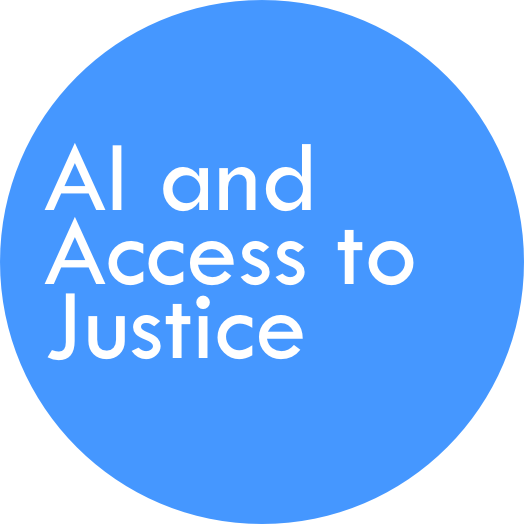
AI and Access to Justice
On this new track, the Legal Design Lab researches how people use AI to deal with their legal problems, what better systems they want, and how to improve the quality and accountability of AI platforms as they operate in the legal domain.
See our main page on AI & Access to Justice here.
Policy Lab class on AI for Legal Help: We have a 2-quarter class in the Autumn and Winter 2023-24 in which students will work with our team to conduct community interviews, run workshops, do research, and set about an agenda for AI platforms’ role in access to justice & strategies for quality improvement and accountability.
See more about the Policy Lab class here.
Stakeholder workshops on AI for & Access to Justice risks and opportunities. We are holding a series of interactive design workshops with court leaders, legal aid lawyers, access to justice coordinators, and technologists to discuss how AI can be deployed for Access to Justice, and what risks need to be planned for. Read more about these networking events. Read more about them here.
Learned Hands: Our Lab collaborated with the Suffolk LIT Lab to develop a data-labeling game platform, Learned Hands. On this game, laws students and others can read people’s anonymized legal problems, spot legal issues, and vote whether a certain kind of issue is present or not. This game play creates a labeled data set, that is used to do data analysis about legal needs trends, and to build an issue-spotting NLP bot, Spot.
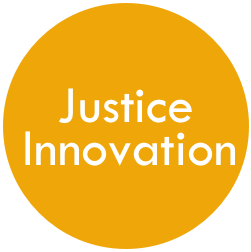
We partner with legal aid groups, courts, and non-profits to design, pilot, and scale innovative new access to justice initiatives.
Justice Innovation work at Legal Design Lab
On this track, the Legal Design Lab creates new services, tech, and policies that can improve people’s access to the civil justice system.
The Legal Design Lab’s main mission is to promote access to justice through innovative methods and projects. Our Justice Innovation track includes classes, user research, software & AI development, and peer cohorts focused on improving people’s access to the civil justice system.
Main website: Find our Justice Innovation website that profiles methods, projects, and principles to use when developing new efforts to improve the justice system.
Access to Justice Network: Our Lab hosts the Access to Justice Network, a community of justice professionals. This is the successor organization to the Self-Represented Litigation Network (SRLN).
Forms and Efiling: With the Stanford Center on the Legal Profession, the Lab has launched the Filing Fairness Project to ease people’s ability to participate in court processes.
Text Messaging for Justice: We built Wise Messenger to make it easy for courts and legal aid groups to text reminders, hotlines, procedural coaches, and online intake with the public. Read more about our texting work here.
Natural Disaster Legal Help: The Lab build a natural disaster legal help app, Flood Proof, to help people in Louisiana to clear titles to their homes so they could get disaster relief and find legal help.
Language Access: Our Lab has partnered with state courts and legal aid groups to study how people want language access support through technology and human services. Read the report from our 2019 class to the California Judicial Council.
The Lab has taught classes and run workshops on innovations in the eviction system, expungement and clearing records, guardianships and conservatorship, debt and money problems, and estate planning.
Past Years’ Tracks
The Legal Design Lab has had many different projects since it began in 2013. Please explore some of our past work below.
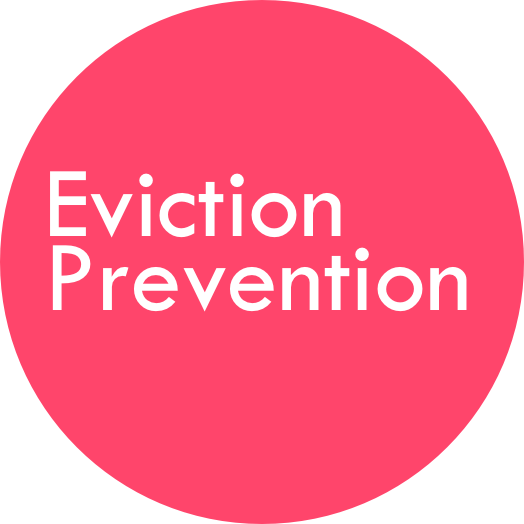
We partner with national non-profits, local and federal government agencies, and justice system professionals to identify & spread the most promising initiatives to prevent evictions & forced displacement.
Eviction Prevention work at Legal Design Lab
On this track, the Legal Design Lab builds strategic networks, identifies the most promising pilots to prevent evictions, and evaluates what works.
Within the broader category of access to justice innovation, our Lab has spent the past 5 years focused on eviction prevention and housing justice in particular. We have a range of eviction-specific innovation projects.
Eviction Prevention Learning Lab cohort: The Lab works with the National League of Cities to run the multi-city peer cohort the Eviction Prevention Learning Lab. It brings city governments, courts, legal aid, and social service providers from over 30 cities together to identify and spread best practices in stopping evictions and promoting access to justice.
Eviction Innovations site: We have documented promising practices in the space on our Eviction Innovations platform. This website has case studies, guides, and repositories of resources to help policy-makers and service providers develop better strategies and interventions for preventing evictions.
Legal Help FAQs: The Lab runs a national question and answer website, Legal Help FAQs, for COVID-19-related eviction questions. It built the site in Spring 2020 to provide a clear, authoritative source on local laws protecting people from eviction.
NAACP Housing Navigators: Through our series of classes on Justice By Design: Eviction, our Lab team and our Stanford students have partnered with the NAACP to refine and scale their Housing Navigator program. We helped them design their website, social media campaign, and service design & strategy.
ABA Eviction, Housing Stability, and Equity Task Force: Lab Executive Director Margaret Hagan is the chair of the American Bar Association’s SCLAID Task Force working on eviction prevention and housing justice. This group sets national standards on housing law and promotes innovative new services and policies across the country.
Eviction Summons Redesign: We have worked with courts in Ohio, Montana, and more to redesign the notices they send out to tenants who have been sued for eviction. We have worked with them to make these official court documents more engaging, comprehensible, and user-friendly. We are studying if they can reduce default rates at eviction hearings.
Better Legal Internet work at Legal Design Lab
The Legal Design Lab has focused for the past five years on improving how people find legal help on the Internet. We have built key data infrastructure for R&D, contributed to cutting-edge AI and digital analysis initiatives, and led cohorts of practitioners through crucial improvements to their court and legal aid websites.
In this track, our work aims for a near-future when people can go online, ask search engines or social media about their life problem, and get local, authoritative, user-friendly legal help.
Main website: Visit our Better Legal Internet website to find more detailed descriptions of the projects mentioned below, on improving search, social media, website design, and data analysis.
Legal Help Dashboard: This webpage from the Lab guides legal help website administrators through the main steps to improving their website. Check up on your tech, design, content, and search rank. Follow our guides to improve on all four areas. This page provides tools, guides, and ranks to make legal aid and court websites better able to serve the public.
LIST Taxonomy: Our Lab has established a master taxonomy, Legal Issues Taxonomy (LIST), of all the main legal issues that people in the US face. These standardized codes can be used by organizations, tech providers, and others who are trying to better map, categorize, and develop tech about legal needs.
Schema Markup SEO Tool: How do legal aid and court websites show up when people search Google for help? We built a tool to help these websites show up higher and to the right audiences. The Schema Markup tool lets legal service groups create code that tells search bots from Google, Bing, Yahoo, and other search engines exactly what is on their website, what jurisdictions it applies to, what legal issues it can help people with, and how people can contact them.
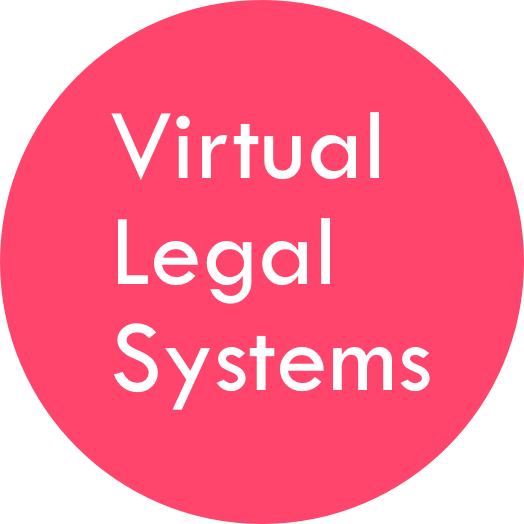
New virtual and hybrid justice systems should work better for litigants, and allow for equal, dignified access.
Virtual Legal Systems work at Legal Design Lab
What do the new normal of online courts, virtual legal aid clinics, and digital legal help look like?
Our team is teaching classes, building resources, and testing new prototypes to help create accessible, fair, and empowering virtual legal systems.
Visit our Court Observation Hub, that provides a national database of court watch and observation groups active in seeing what happens on the ground in courts.
Learn more about our classes here, including collaborations with Harvard Graduate School of Design, MIT, Massachusetts Housing Court, designer Virgil Abloh, and architect Oana Stanescu.
.
Smart Legal Tools & Communication work at Legal Design Lab
We are designing and testing new ways to communicate complex legal information.
This includes creating new graphic design and tech tools for improved legal forms notices, policies, contracts, process guides, and beyond.
Our goal is to create standard templates, metrics, and examples for visual designs that best engage and empower people with legal information.
Read more here at our Legal Communication Design page, which has resources, examples, guides, and tools.
.
Explore the Legal Innovations our Lab is working on
AI+A2J Initiative
What are the opportunities & risks for AI in the justice system?
In our AI & Access to Justice initiative, our Lab is conducting user research, AI evaluation, and project development to advance responsible AI that can help the public with legal problems.
We have a Law/Design class called AI for Legal Help, offered in 2023, 2024, and 2025, in which students partner with public interest organizations like the Legal Services Corporation, American Bar Association, LA Courts, and legal aid groups around the country. Students learn how to evaluate, design, and build new AI solutions.
Our Lab also has partnerships with major legal aid groups in LA, Oklahoma, and throughout the country to build cutting-edge new AI co-pilots and infrastructure to help them scale up
Access to Justice Network
The Access to Justice Network is a community of judges, court managers, attorneys, librarians, researchers, technologists, and community leaders dedicated to closing the justice gap.
It is the successor organization to the Self-Represented Litigation Network (SRLN).
Stanford Legal Design Lab hosts and facilitates this community-driven network, to help more court, legal aid, technologists, researchers, and other partners work together to drive innovation in the legal system.
Join the Access to Justice Network by applying here.
Filing Fairness Project
When a person is sued for an eviction or debt, when they need to file a restraining order, or they need to figure out child support, they need to find, fill out, and file court forms.
The Filing Fairness Project is modernizing the court user’s form and efiling journey through an ambitious multi-jurisdiction cohort.

Eviction Legal Help FAQs platform
In Spring 2020, we built a national Legal Help FAQ platform, with 50-state coverage, of renters’ rights and protections during the COVID-19 emergency.
Our team did extensive legal research and assembled a national network of housing law experts to be able to present, in plain language, if renters could be evicted, how much time they had to pay rent, and what new protections they might have in court. It also has a national database of local legal aid groups, court self-help sites, emergency rental programs, and other services that we could connect renters to in each state.
We designed the site to be expandable in coming months, to include more guides and FAQs on how a renter can navigate the eviction process and raise defenses to protect themselves. This site is unique in providing national coverage and detailed legal information for renters.
The Legal Help FAQ platform was built with the support of The Pew Charitable Trusts.
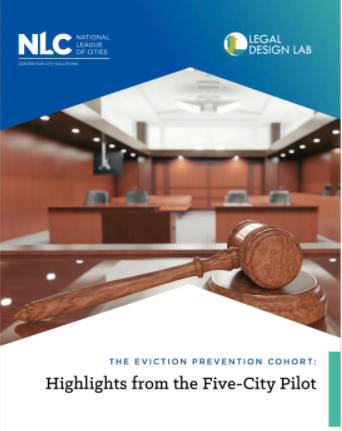
Eviction Prevention Learning Lab
Since February 2020, Stanford Legal Design Lab and the National League of Cities are leading the Eviction Prevention Learning Lab.
This is a multi-city cohort in which city leaders (from government agencies, legal aid, courts, nonprofits, and private industries) learn about innovative eviction prevention strategies, share peer learnings, and design new interventions.
The current cohort has 30 cities and is an 18-month program focused on emergency rental relief, eviction diversion programs, court activation, effective community outreach, smart use of data, and other topics that have arisen during COVID-19 and the eviction crisis.
Eviction Innovation
We are researching and building promising ways to address the eviction crisis are, and we are building a network of local city leaders to coordinate the development and evaluation of these new interventions. These include new policies, technologies, and service models, that we are profiling on our Eviction Innovations platform.
The platform is in coordination with our Eviction Prevention Learning Lab with the National League of Cities. The website presents case studies and strategies that have emerged from the cohort, and that can help guide them.
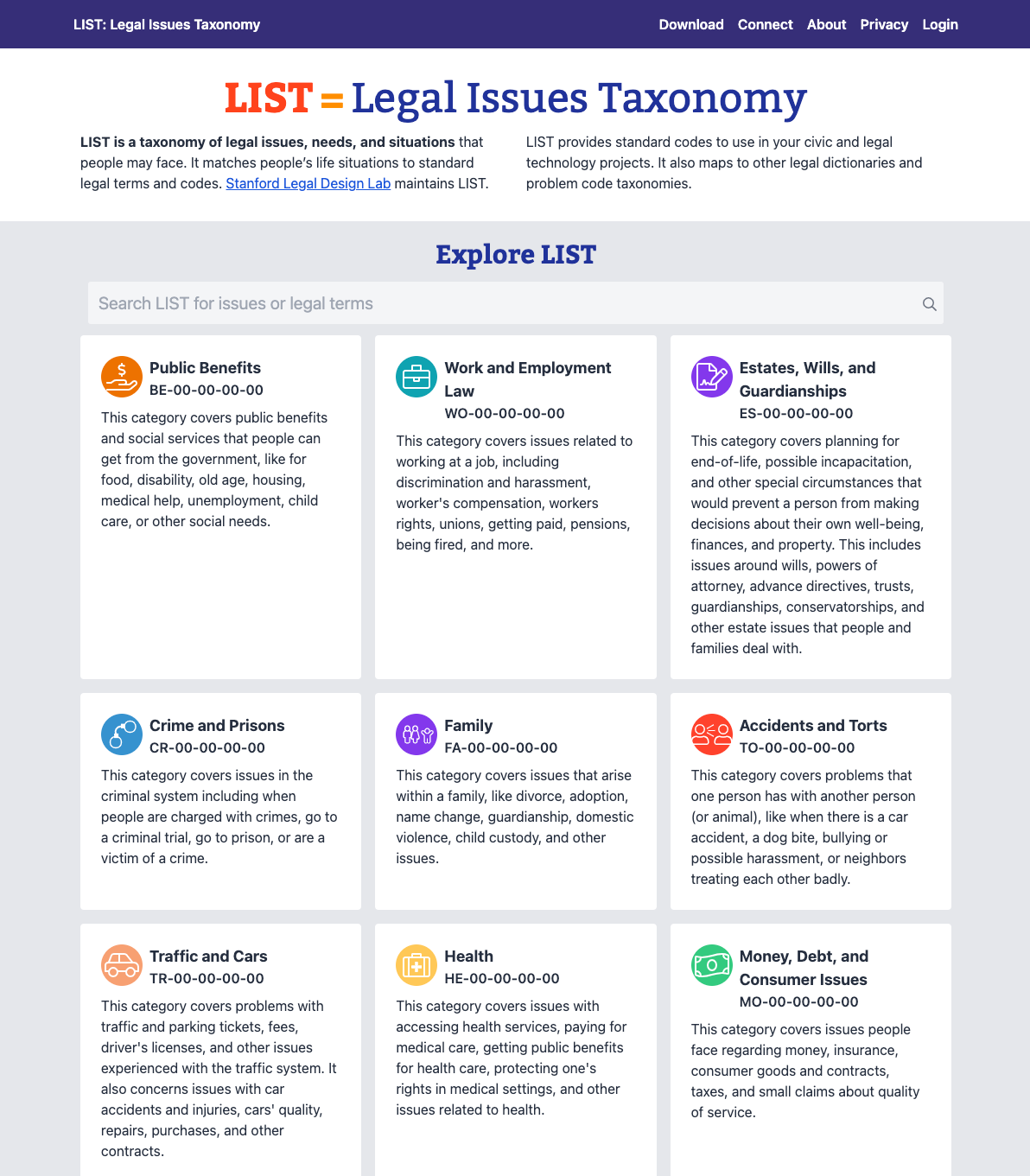
LIST: Legal issues taxonomy
Our team has been building LIST, a user-centered taxonomy of legal problems that people might have in the U.S. It’s called LIST, the Legal Issues Taxonomy, (formerly National Subject Matter Index version 2), since it is an iteration of a taxonomy originally developed by legal aid technologists fifteen years ago.
This taxonomy is an essential tool for classifying people’s issues and the legal help resources available to them online. The taxonomy provides standard problem codes, definitions, and examples of the legal scenarios that people might find themselves in.
It is useful for app and bot developers, machine learning projects, legal needs analysis, legal help webmasters, and others who are interested in building more interoperable, AI-powered legal tools.
Read more about how you can use it here at our article on LIST use cases and deployment.
Learned Hands
Learned Hands is a machine learning project to use interactive games to build tools that can automatically spot people’s legal issues. We built this game for law students and lawyers to play, by reading people’s legal stories from Reddit and elsewhere, and then labelling the stories with standard legal issue labels.
With this labeled data, we can then train machine learning models to automatically spot people’s issues and potentially connect them with resources, find patterns of needs, and integrate more AI into access to justice tools.
As more people play Learned Hands, it contributes to the SPOT classifier, which can then be used by our bots and other groups’ tools to spot people’s legal issues in their posts and tweets.
The goal is to be able to help people find the local, public interest help — even if they don’t know that their problem around debt, family, housing, work, or traffic actually has a legal solution.
Learned Hands was built with Suffolk LIT Lab and the support of the Pew Charitable Trusts.
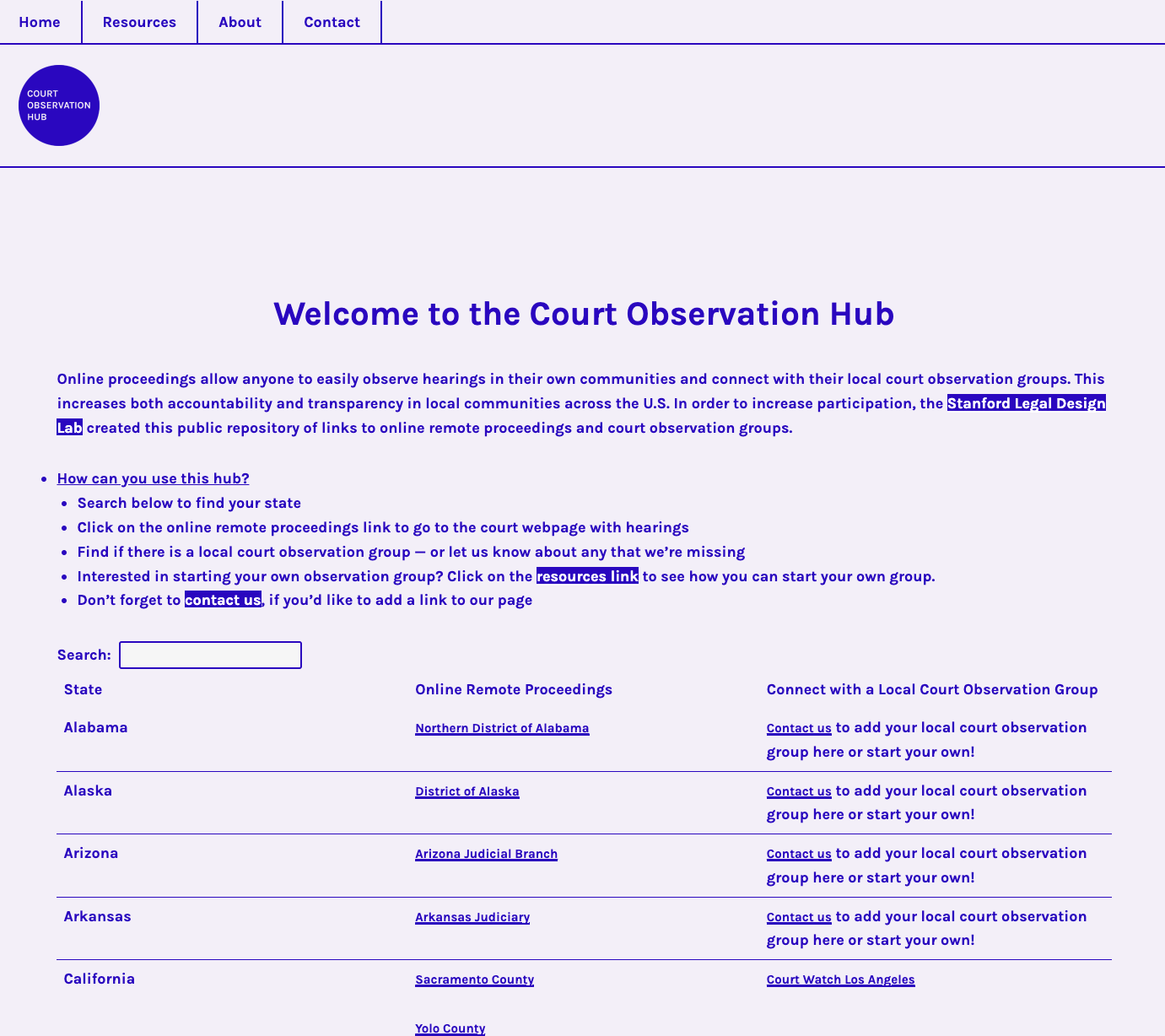
Court Observation Hub
Our team has built a central tool for teams to observe online courts. The Court Observation Hub has a master list of online court links, and groups that already do court watching.
Do you want to start a Court Watch program?
Do you want to find the programs that already exist in different jurisdictions?
The Court Observation Hub has the links and resources to help you do virtual court watching.
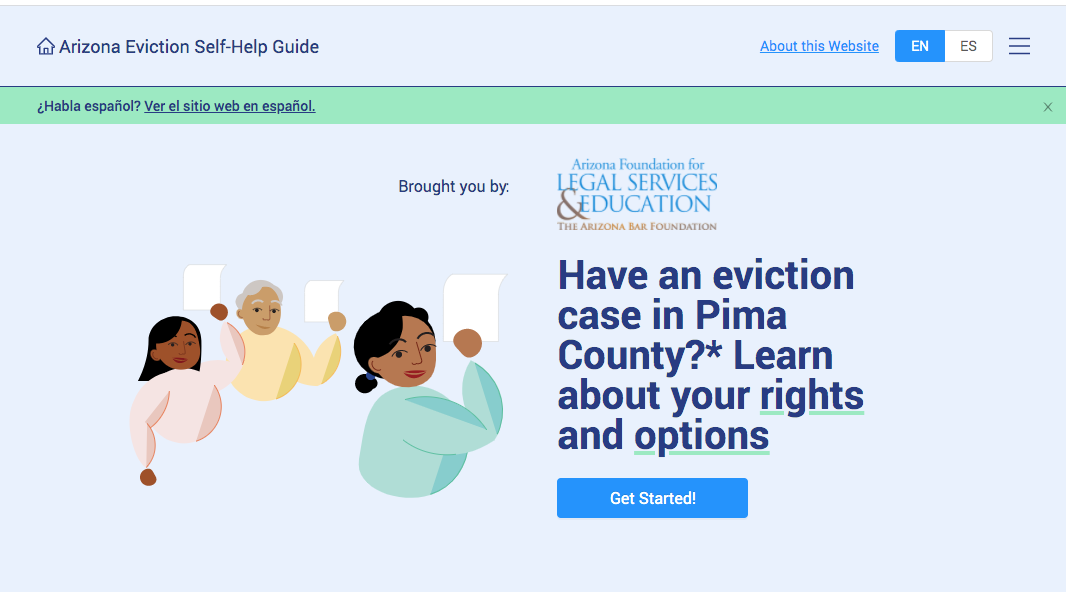
Our team, working with university, court, and foundation partners in Arizona, built the Arizona Eviction Self-Help website for tenants in Pima County to understand their rights, prepare documents, and get court hearing information for their upcoming eviction hearing.
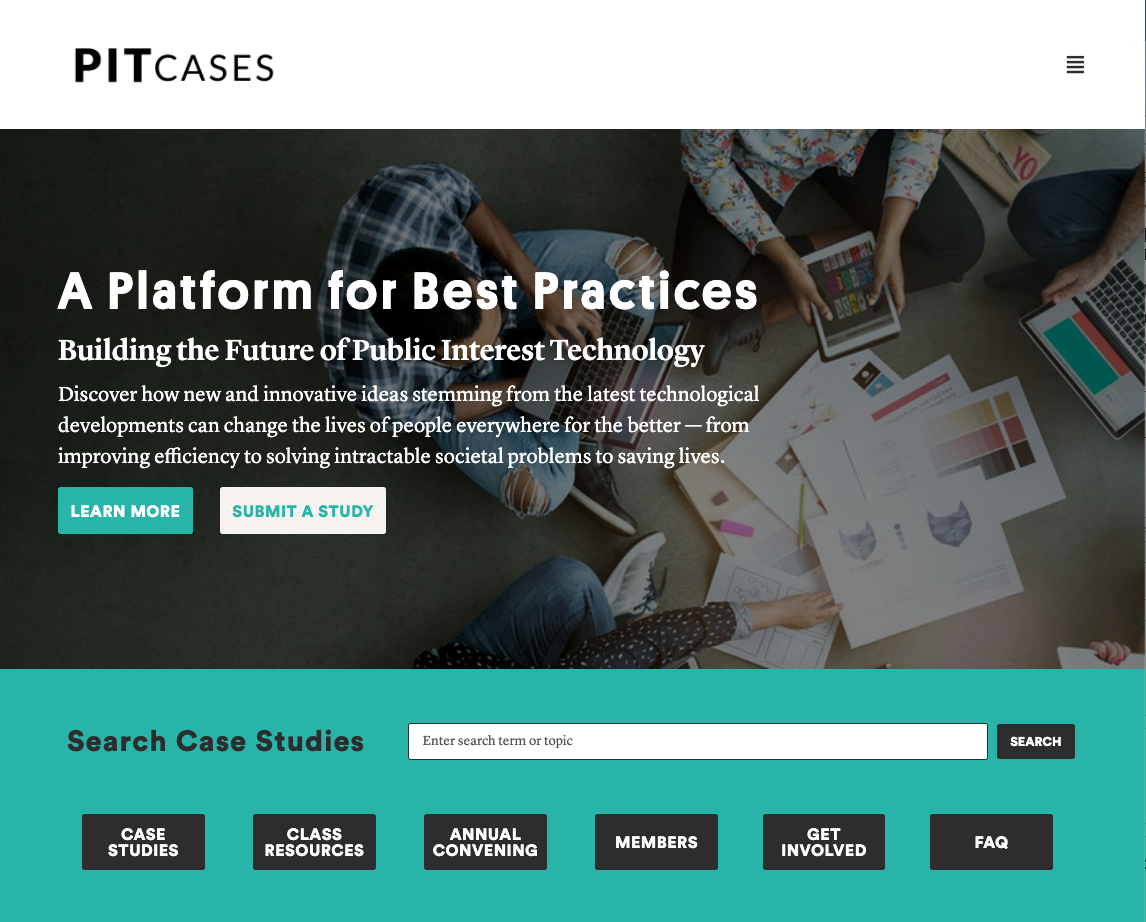
Our team helped build a Public Interest Technology case study platform with the PIT-UN network, Georgetown, Howard, and New America. We also have work on legal regulatory sandboxes in Utah and elsewhere.

Flood Proof is a mobile app to help people after a natural disaster to start the process of ‘clearing title’ to their house. We built it with the ABA Center for Innovation, and local legal aid groups in Louisiana and Texas.
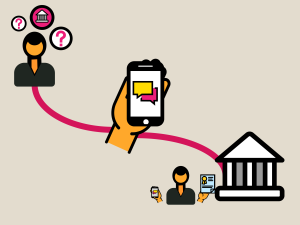
Wise Messenger is a web application that allows courts, legal aid groups, and others to send automatic text messages (or other messenger application messages) to their users. It lets groups create interactive templates of hearing reminders, intake screeners, procedural coaches to people going through the legal system.

Navocado is a web platform to create and publish better guides to legal processes, with visual and interactive step-by-step triage and process guides.

We create Court Visual Guides, which are print and digital visual guides to complex legal processes, that explain how a person can navigate systems like traffic court or eviction lawsuits.
Our Latest Posts
Read our latest long-form essays and reports on our Medium publication Legal Design and Innovation.
We post our team’s work and reports here, as well as guest essays from professors, designers, technologists, students, and others working on legal design efforts.
If you’re interested in contributing a piece to Legal Design & Innovation, please be in touch!

Access to Justice Network
The Legal Design Lab is thrilled to be the home of the new Access to Justice Network, the successor organization to the Self-Represented Litigation Network. What is the Access to Justice Network? The Access to Justice Network (A2J Network) is a community of judges, court managers, attorneys, librarians, researchers, technologists, and community leaders dedicated to…
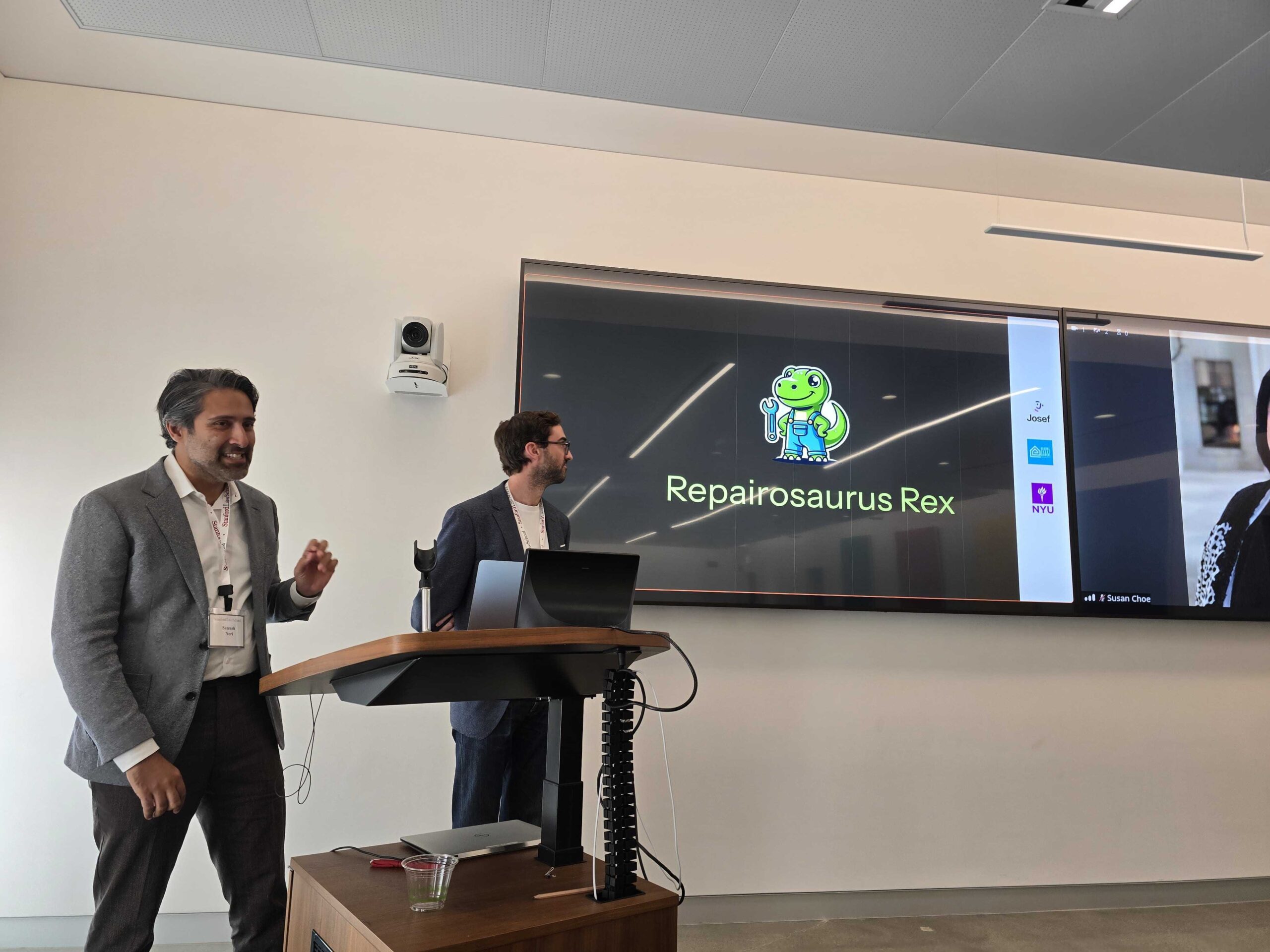
AI + Access to Justice Summit at Stanford
On October 17 and 18, 2024 Stanford Legal Design Lab hosted the first-ever AI and Access to Justice Summit. The Summit’s primary goal was to build strong relationships and a national, coordinated roadmap of how AI can responsibly be deployed and held accountable to close the justice gap. AI + A2J Summit at Stanford Law…
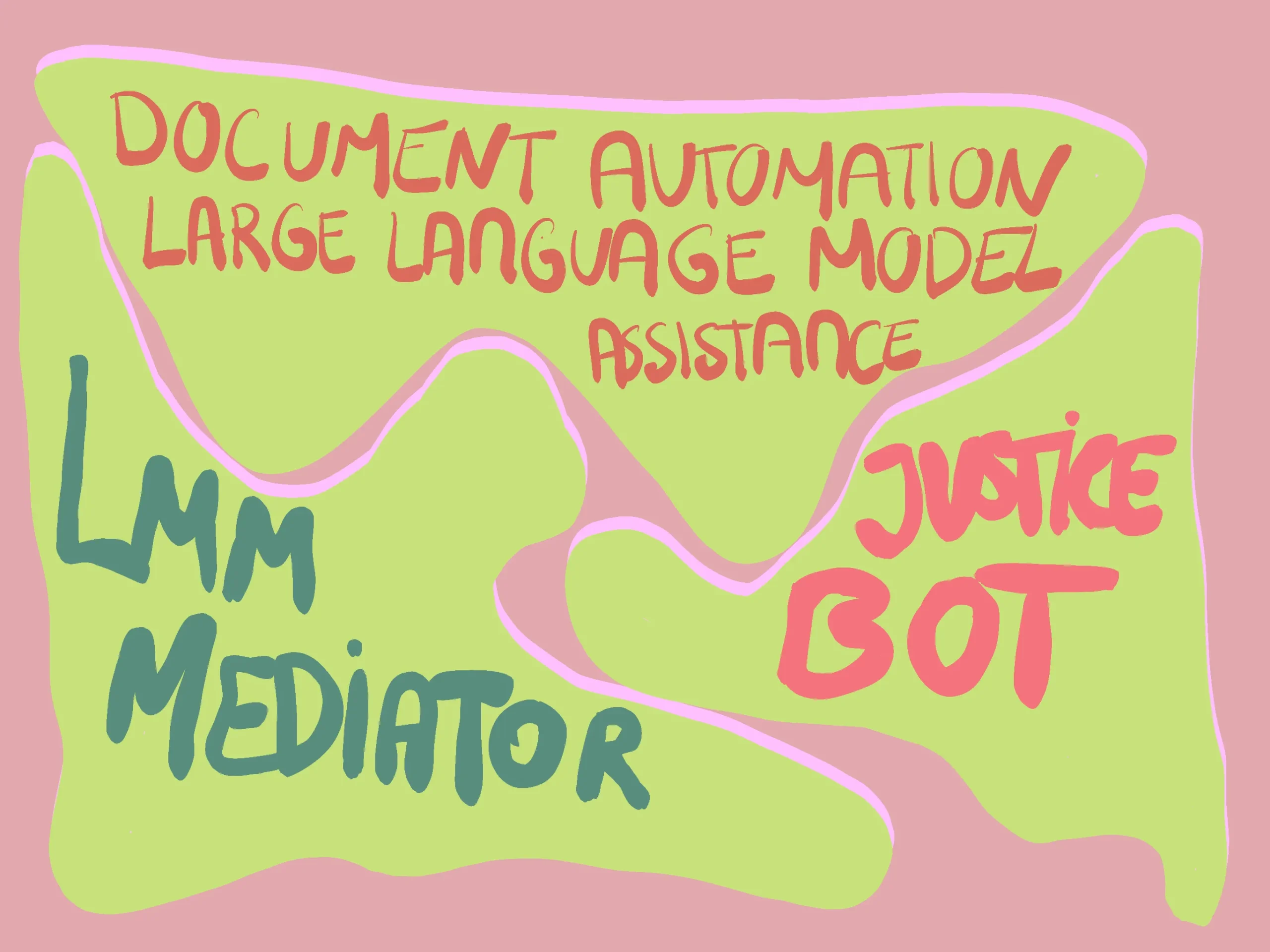
AI and A2J webinar series: Hannes Westermann — The Hammer and the Carpenter
By Nóra Al Haider When you explore the online legal community space, you’ll notice that the topic of AI and Access to Justice (A2J) comes up quite frequently. Most agree that AI & A2J is a consequential topic. However, even though the importance of the topic is recognized, the phrase itself remains nebulous. What do…
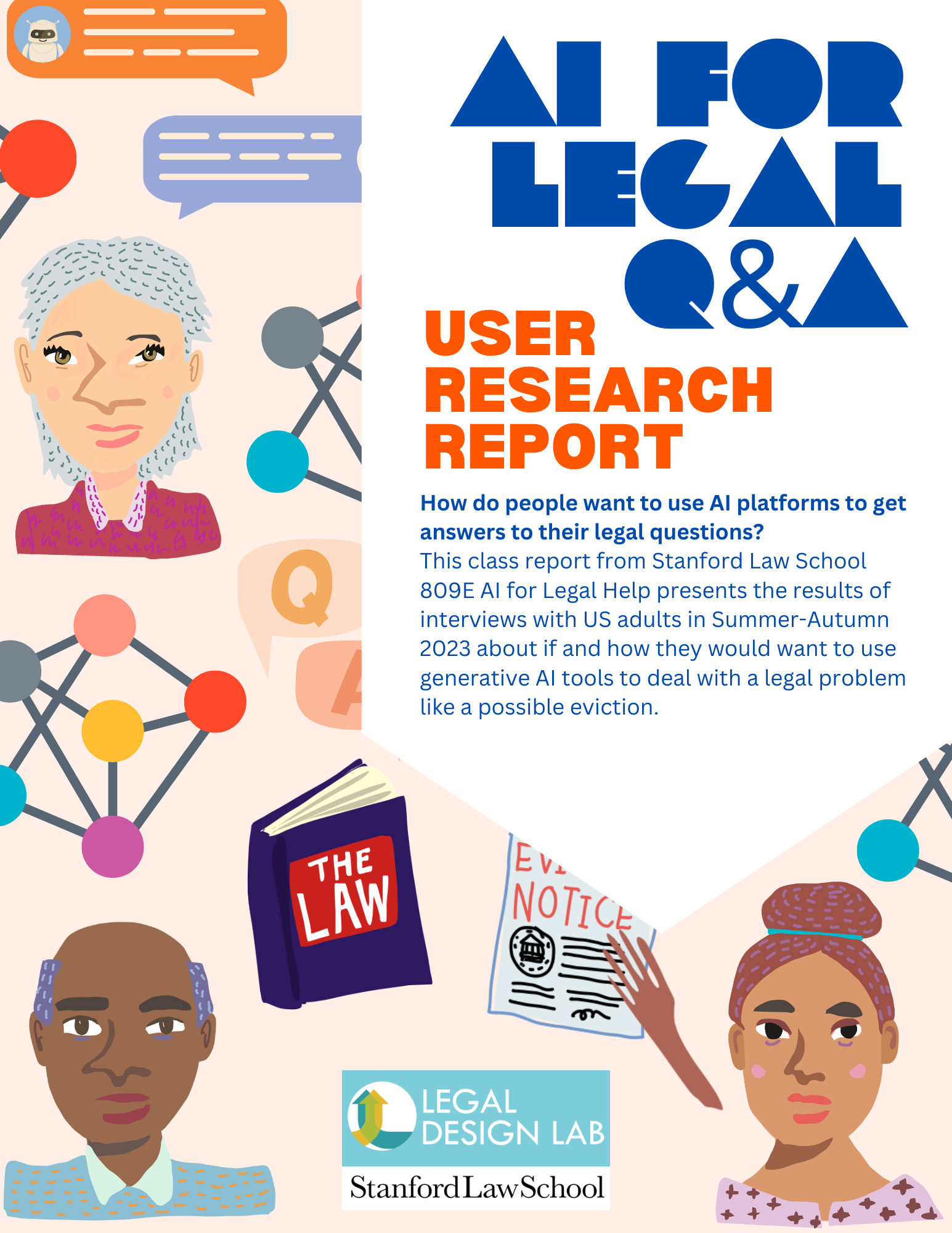
User Research Report on AI for Legal Q&A
A report from the students in the Autumn 2023 Stanford Law/d.school class “AI for Legal Help”, 809E. Please explore this January 2024 report from the Stanford policy lab/design lab class “AI for Legal Help.” The students interviewed adults in the US about their possible use of AI to address legal problems. The students’ analysis of…
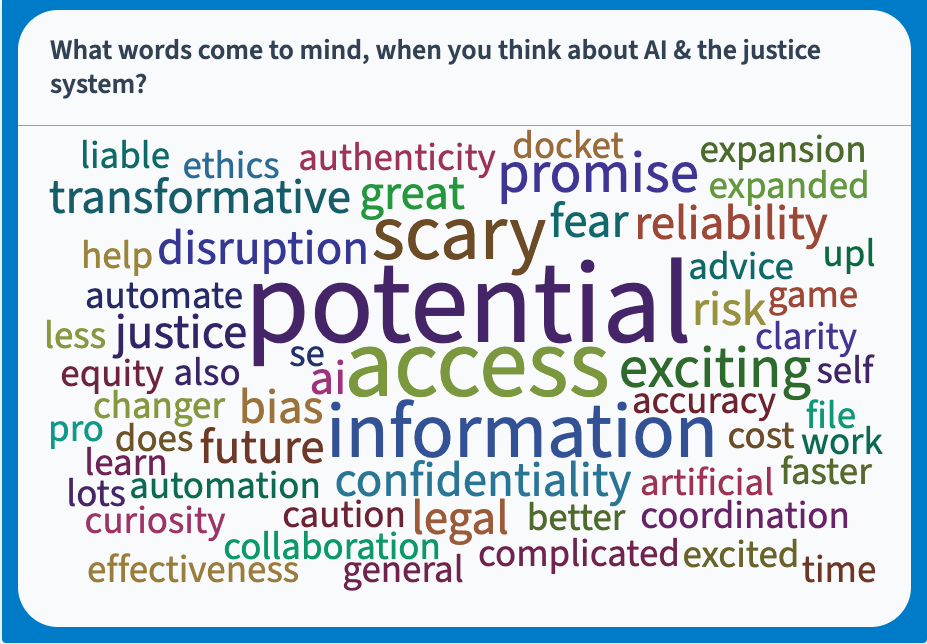
Bringing an AI & Access to Justice Community Together
What we learned about at the LSC-ITC conference of civil justice professionals, about the state of AI & A2J Last week, our team at the Legal Design Lab presented at the Legal Services Corporation Innovations in Technology Conference on several topics: how to build better legal help websites, how to improve e-filing and forms in state…
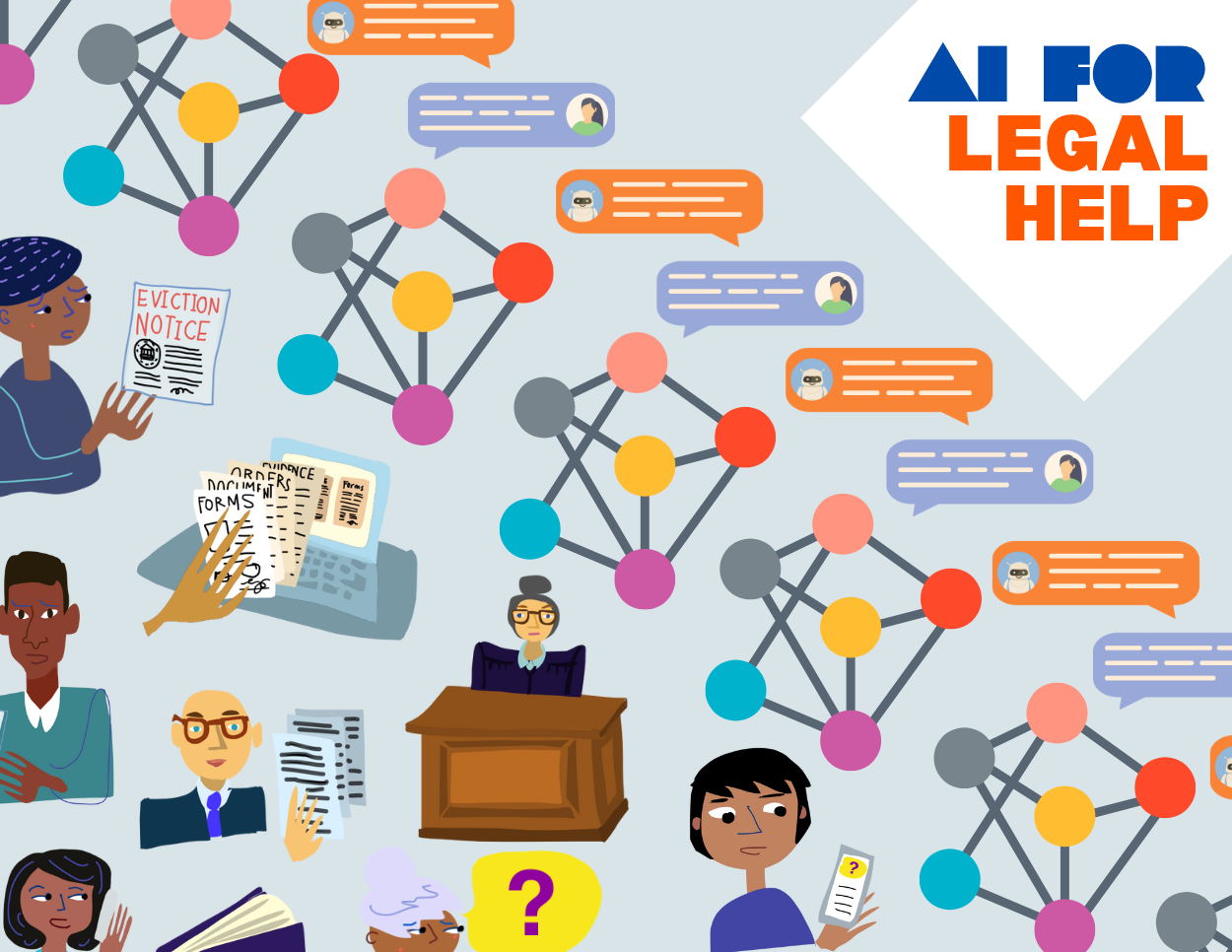
AI & Legal Help Crossover event
What can justice professionals be working on, to make stronger relationships with technologists researching & developing AI platforms? How can legal and computer scientists collaborate for human-centered, effective AI for access to justice?
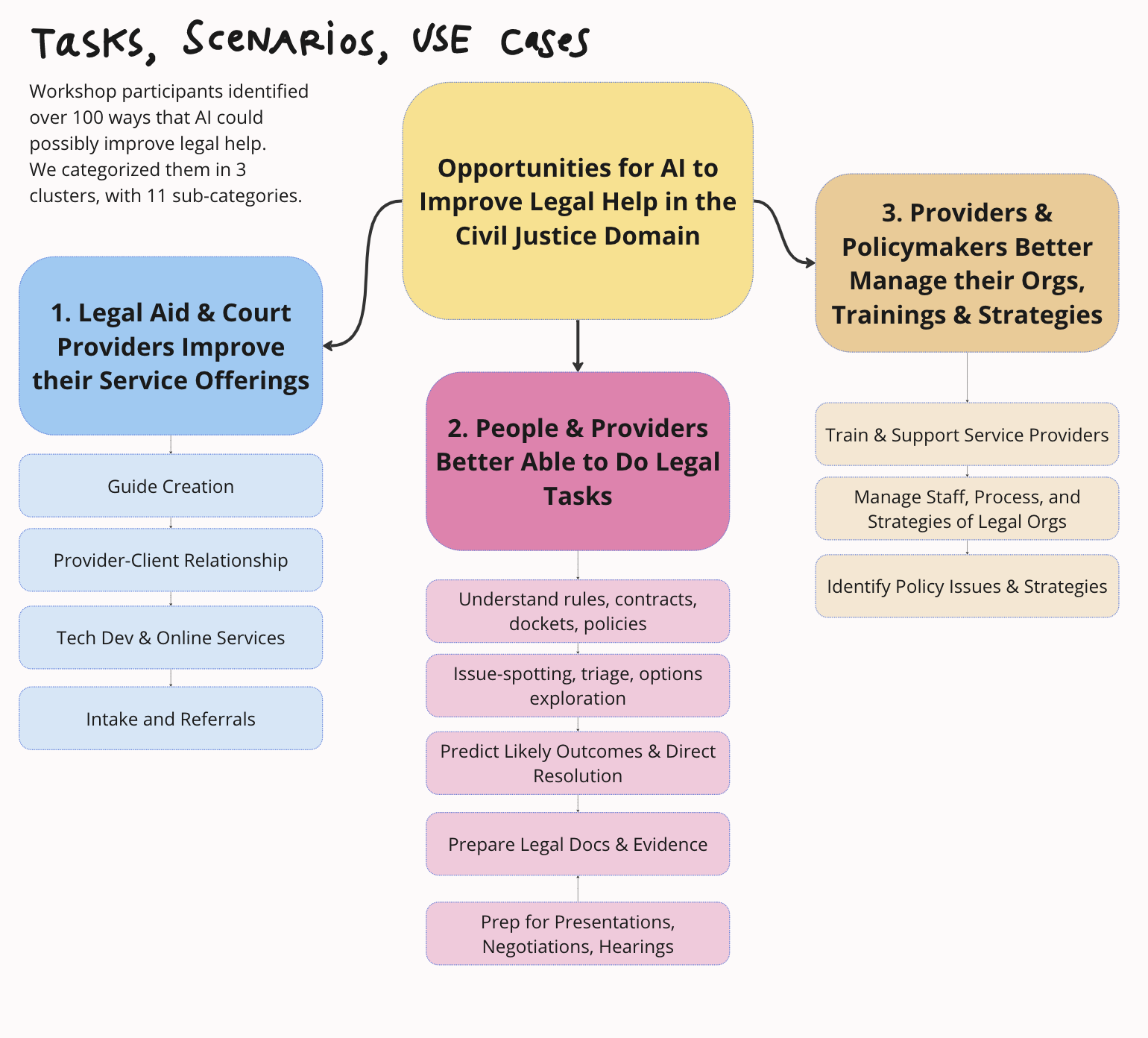
AI & Access to Justice: Opportunities, Risks, and Next Steps workshop
As more lawyers, court staff, and justice system professionals learn about the new wave of generative AI, there’s increasing discussion about how AI models & applications might help close the justice gap for people struggling with legal problems. Could AI tools like ChatGPT, Bing Chat, and Google Bard help get more people crucial information about…
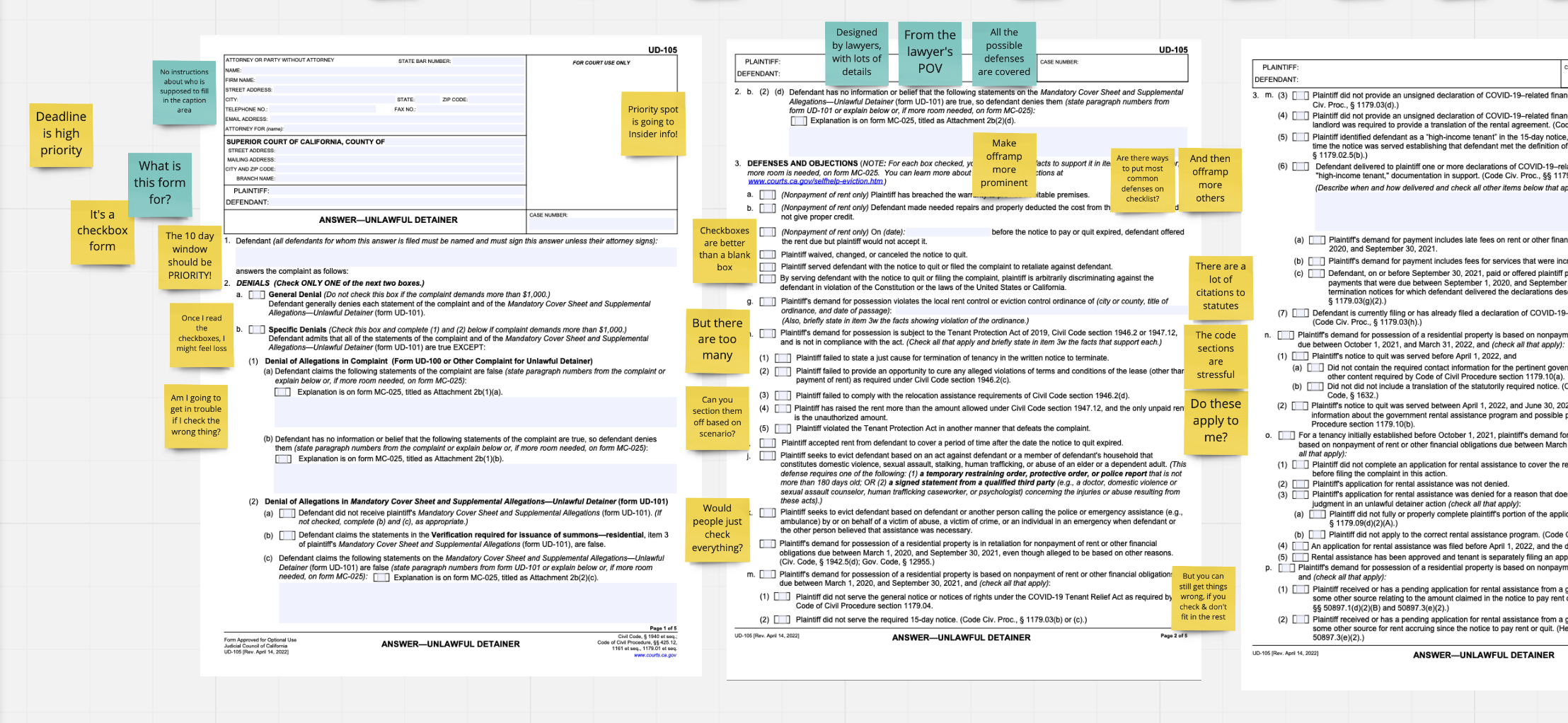
How Do you Design a User-Friendly Court Form?
More court leaders realize that forms are essential to people’s access to the justice system, and want to make these forms more usable, useful, and engaging. But how exactly can courts improve the user-centered design of their official forms?
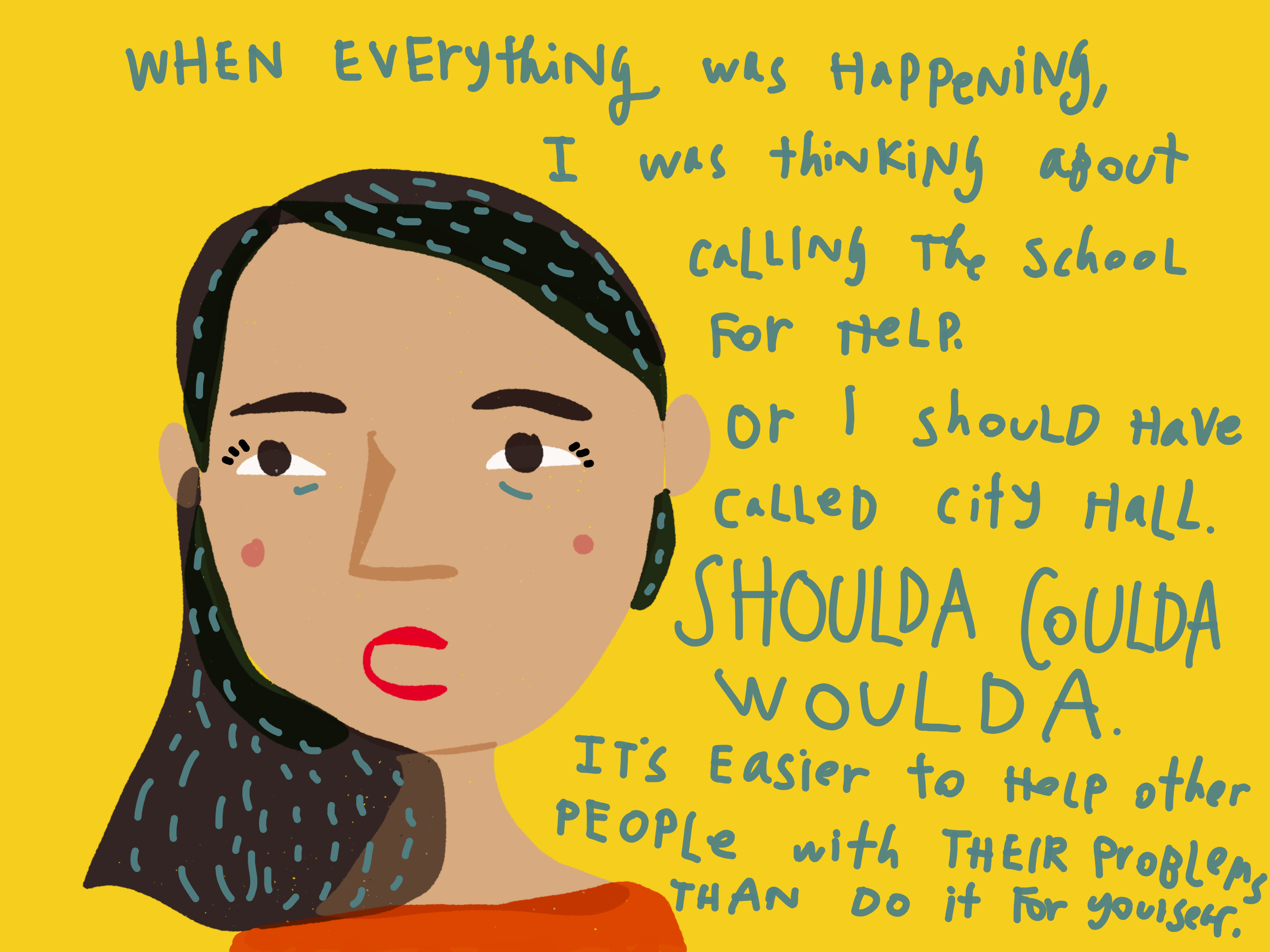
Barriers to Getting Eviction Help: class report
Many of the eviction prevention resources focus on getting people help once a lawsuit is filed against them. Or they are about connecting them with a lawyer to fight back against the eviction. Why aren’t more tenants making use of these services? Our Justice By Design: Eviction class interviewed tenants across the country about their…
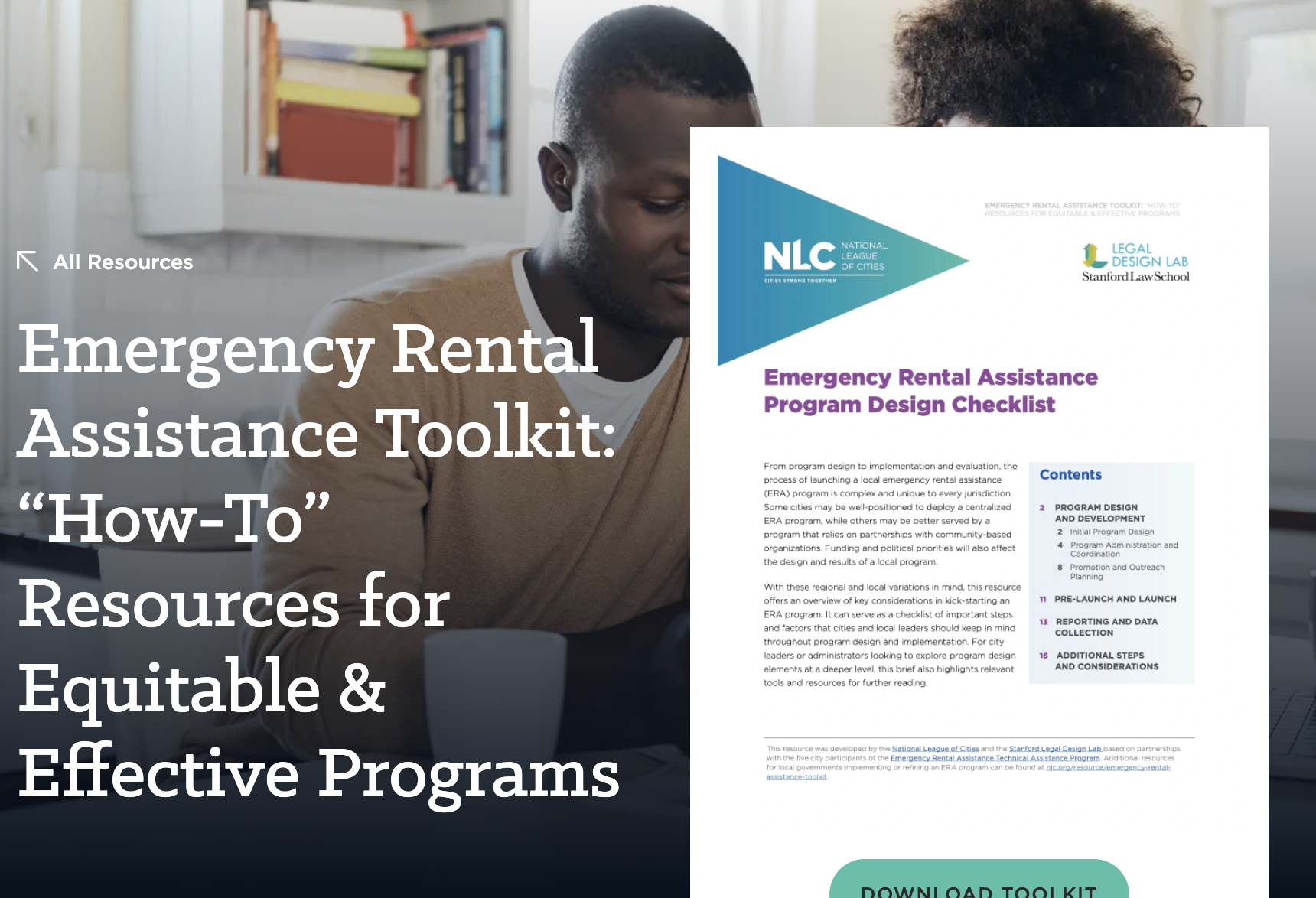
Emergency Rental Assistance Toolkit for local policymakers
How can more city agencies, courts, and nonprofits connect to people at risk of eviction? How can they use rental assistance to stop people from being forced from their homes? Find this toolkit full of practical guidance to use in your region.
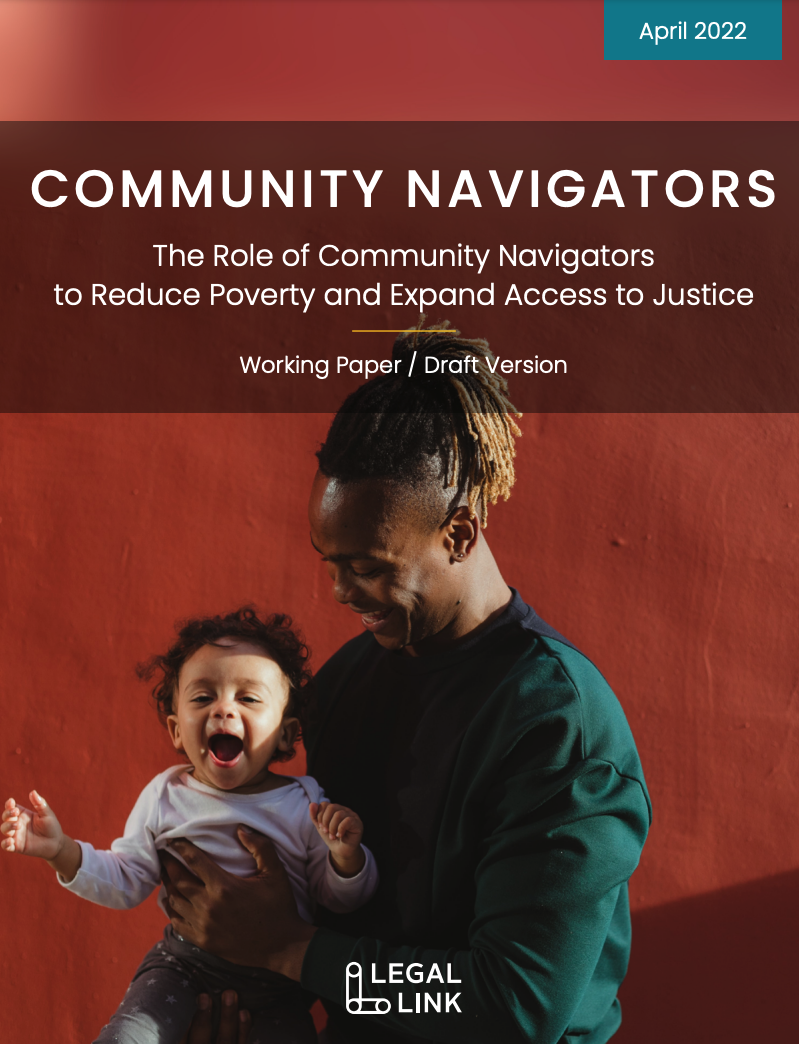
Community Navigators report
This new report from Legal Link and the Lab profiles how community navigators can promote access to justice and reduce poverty by taking a human-centered approach.
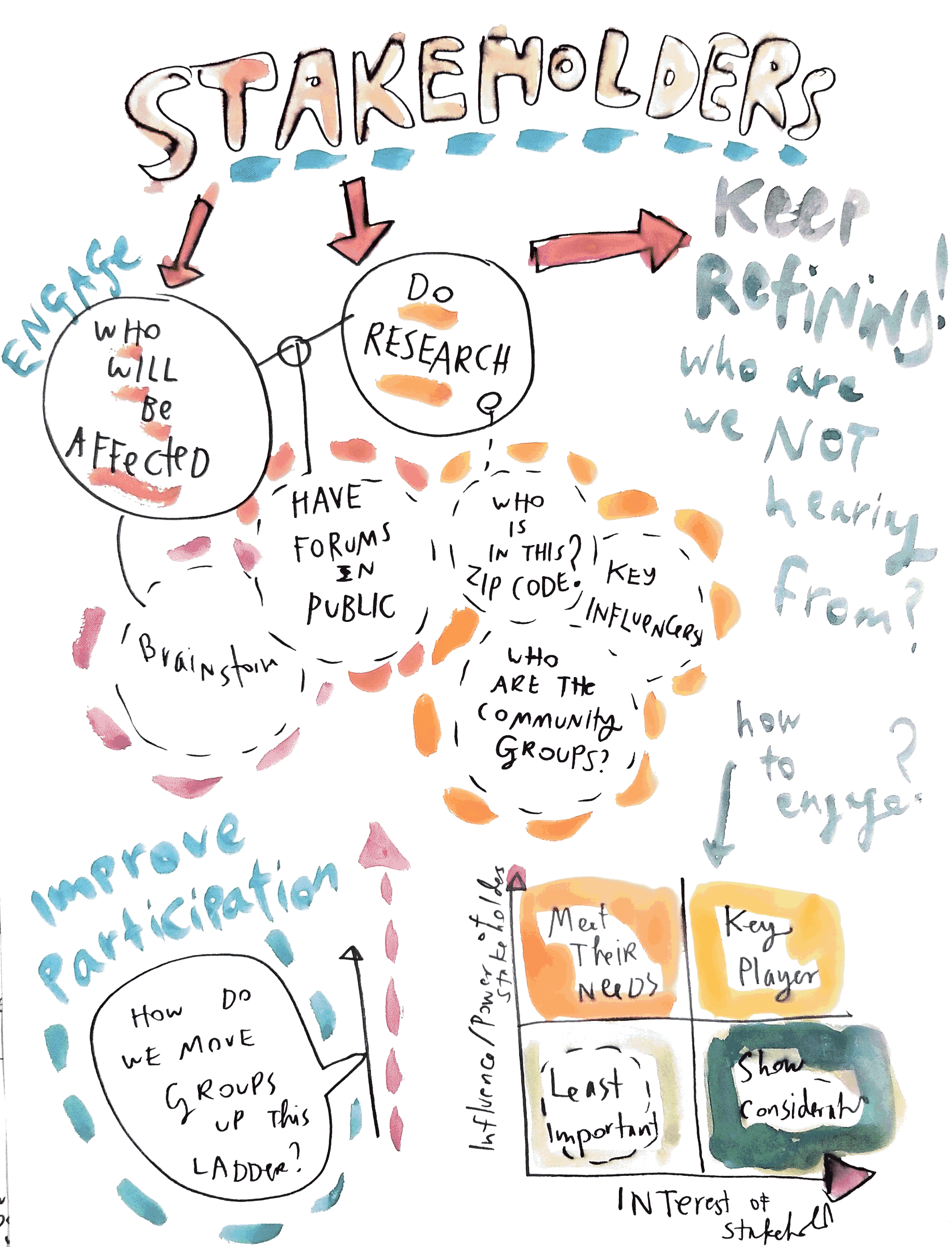
Civic Design class
Our Lab’s Spring 2022 class is a new offering: Civic Design, where we focus on participatory policy-making in local governments, to bring innovative new solutions for better cities.
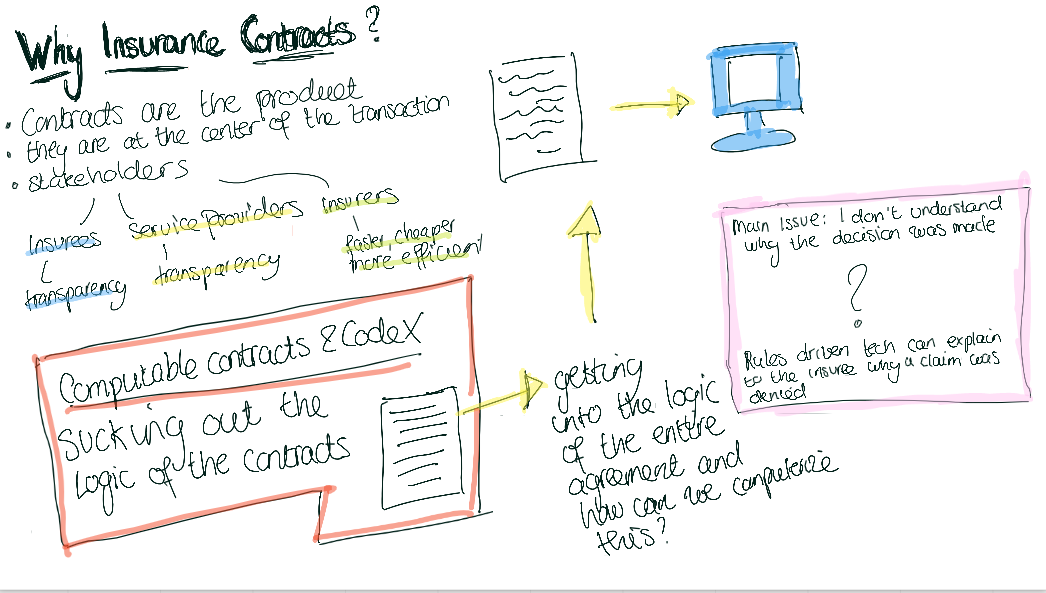
There Has to Be a Better Way Than This: New directions for insurance contracts
How could computable contracts improve people’s health insurance contracting? by Nora al-Haider, Luz Daniel, Shobha Dasari, Margaret Hagan, Arianne Marcellin-Little, Alistair Murray, Michael Perlmutter, Roland Vogl, and Annie Zhu This piece was originally published at our Legal Design & Innovation medium publication. Table of ContentsKey Opportunities for Human-Centered Computable Contracts“Let Me Know What You Know”:…

Human Centered Computable Contracts class
In Winter Quarter, our Lab Team is working with the CodeX team, to co-teach a new class at Stanford Law School. It is a hands-on, project-based class, about how to make insurance contracts more accessible, intelligent, and human centered. It builds on our past classes on user-friendly privacy policies, and contract design labs. The class…
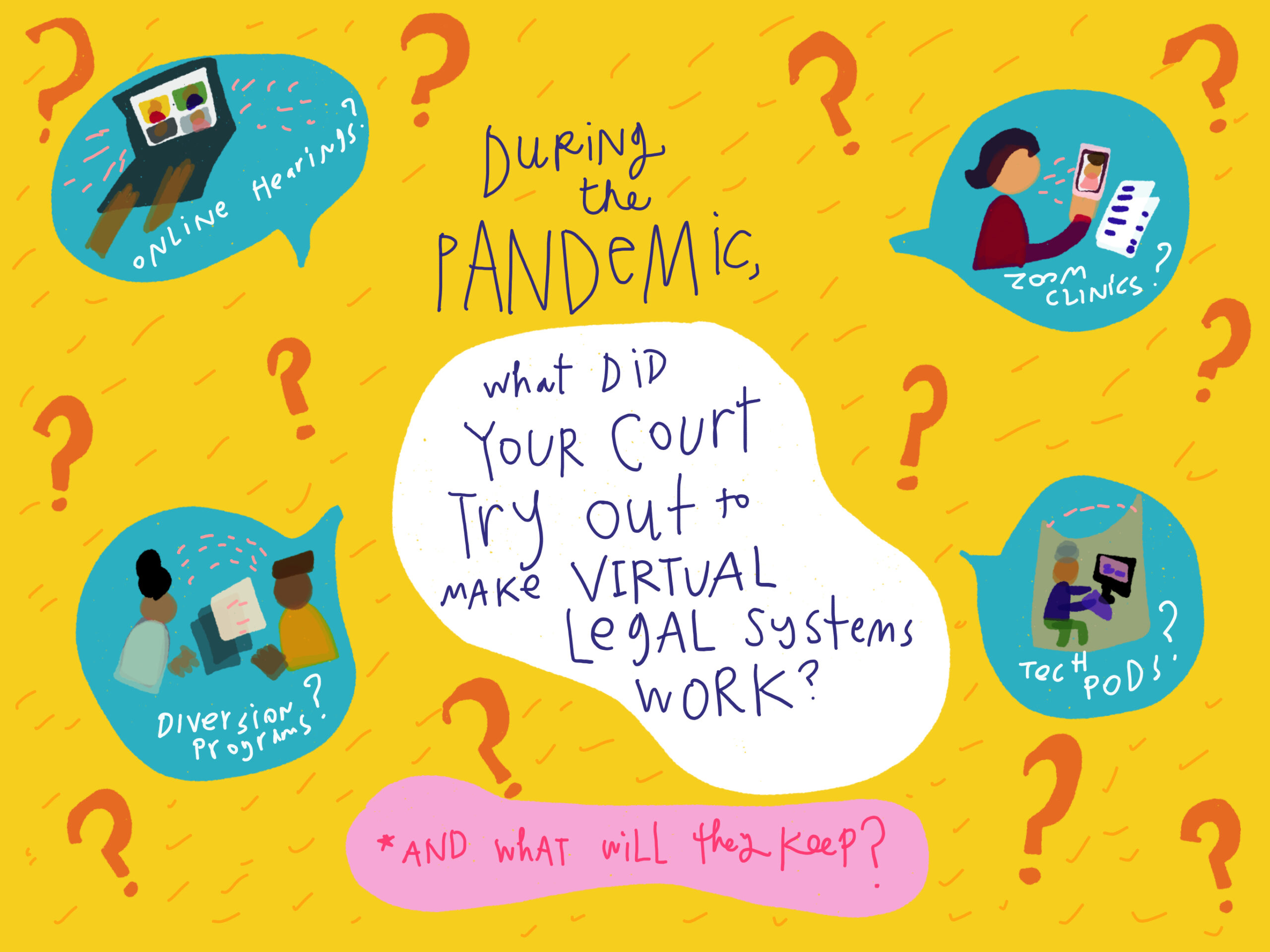
Court survey on virtual legal systems
Do you work at or with a court? Have you been changing tech, process, rules, and help during the pandemic? We’d love to hear from you! Fill out this short form below (or at the link), and we will reach out to schedule an interview. https://docs.google.com/forms/d/e/1FAIpQLScKKWIRnBw4mhGHr9MtHygeFoe4R5jIk80mAhnL8RFUIUFAjg/viewform The Stanford Legal Design Lab is looking to speak with court…
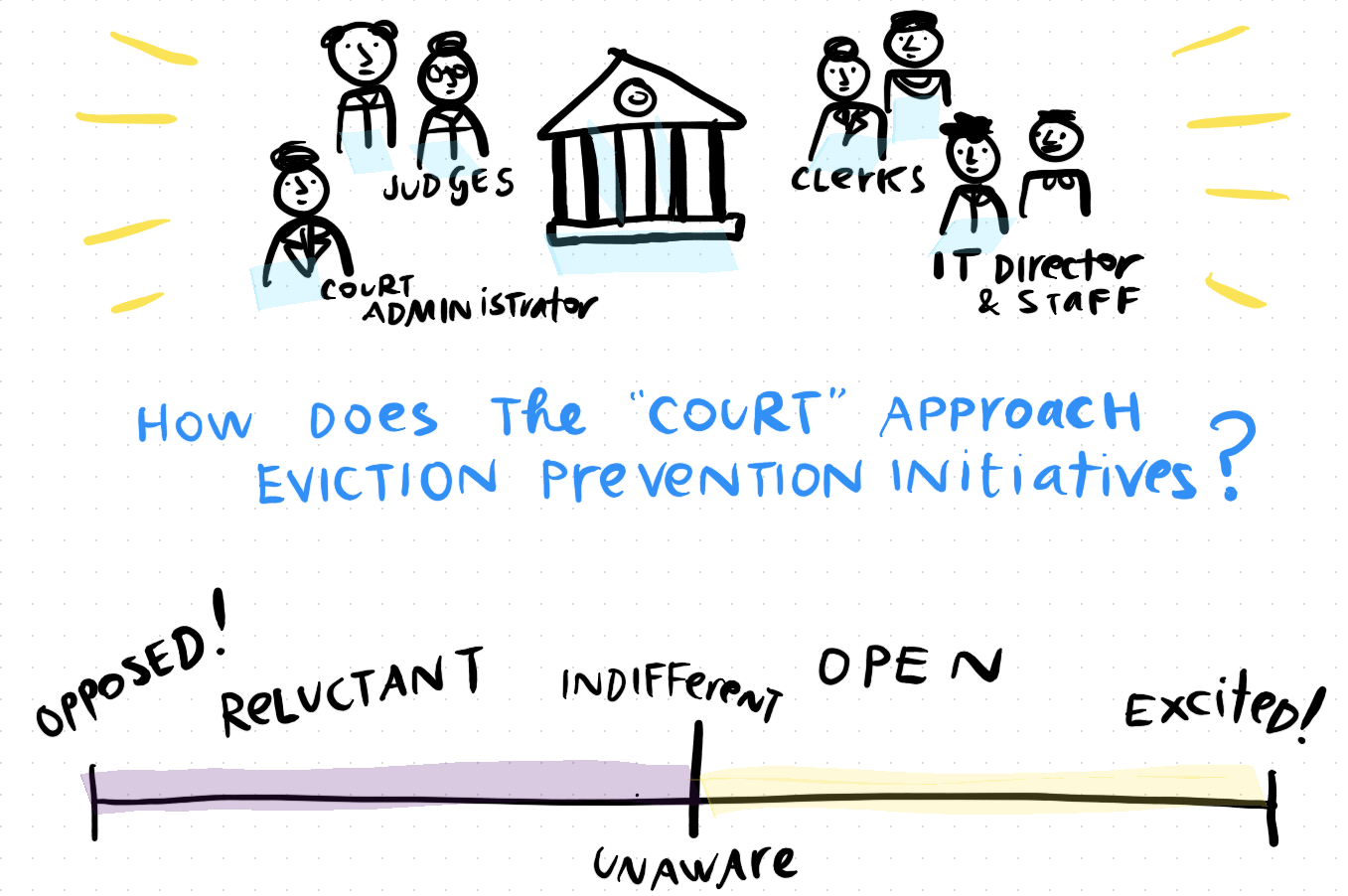
Autumn 2021 Justice By Design: Eviction
In Autumn 2021, the Legal Design Lab will be teaching its newest version of Justice By Design: Eviction, focused on challenges around creating more community legal navigators & court involvement in eviction prevention initatives.
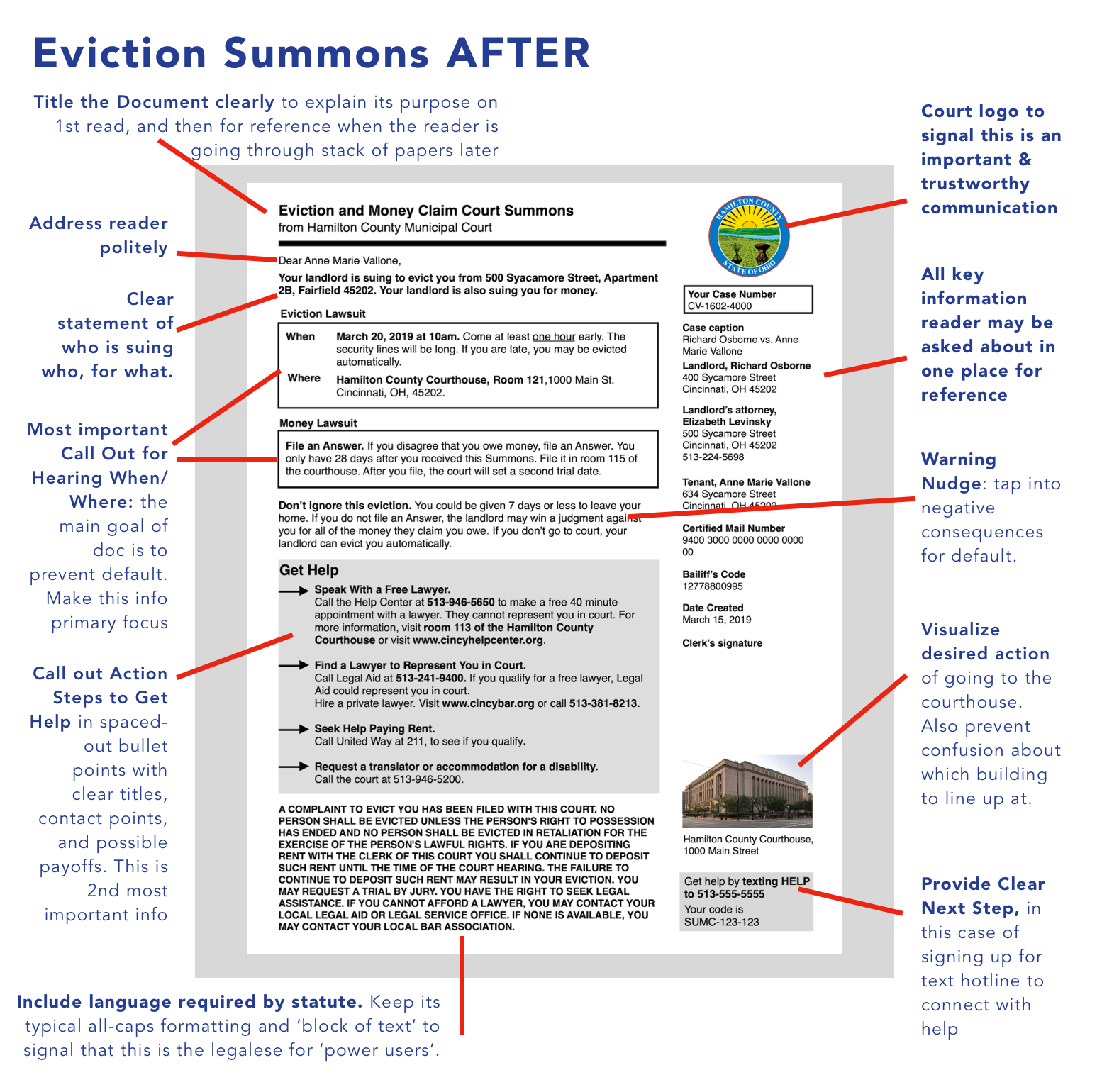
What does a user-centered eviction summons look like?
Find design principles and examples for improving the court document that people get when they are being sued for eviction.
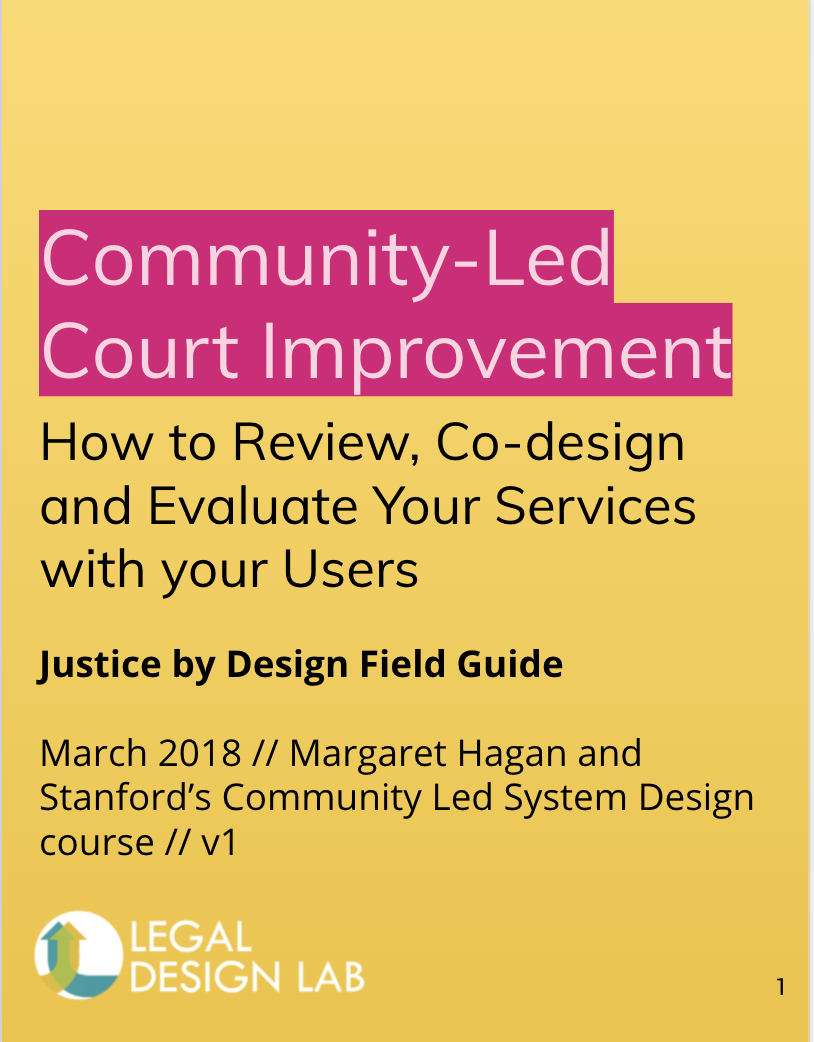
Field Guide on Community-Led Design
This is a Justice By Design field guide for court administrators, judges, and other service-providers to engage more members of the public in innovation work to increase access to justice.
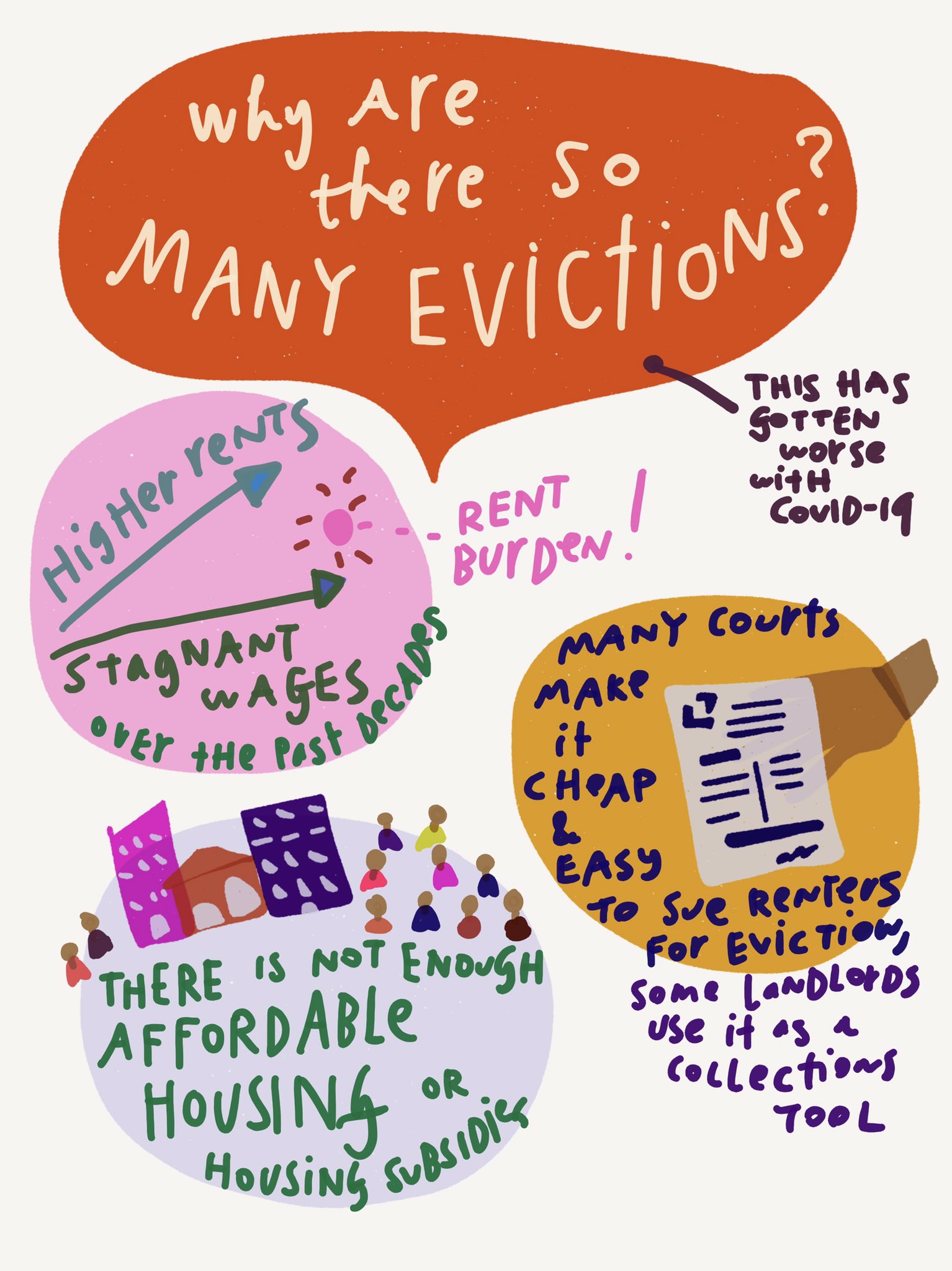
An Equity Lens on Eviction Prevention
The Stanford Legal Design Lab has been collaborating with the National League of Cities to run a 30-city cohort, the Eviction Prevention Learning Lab. We run regular meetings, technical assistance sprints, and peer-learning to spread best practices on eviction prevention. And every quarter we have a big meeting on an issue that many city leaders and communities…
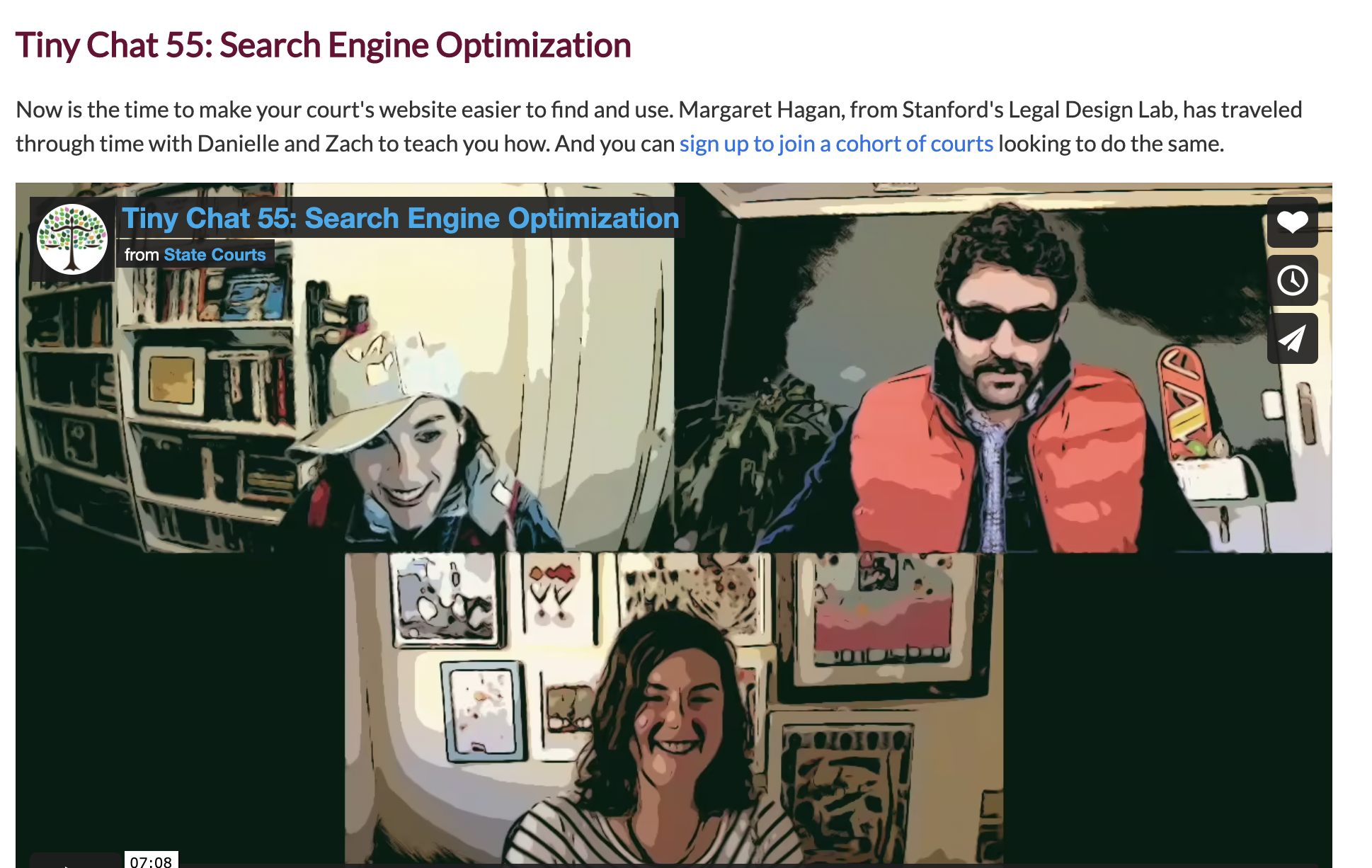
Tiny Chat on Court SEO & Legal Help Online Cohort
The National Center for State Courts hosts great, fun, quick videos on innovations & policy in the state courts. They’re called Tiny Chats, and the latest one is all about Search Engine Optimization (SEO) for public interest legal help websites. I talk to Danielle Hirsch & Zach Zarnow (dressed in their best Marty McFly getups)…
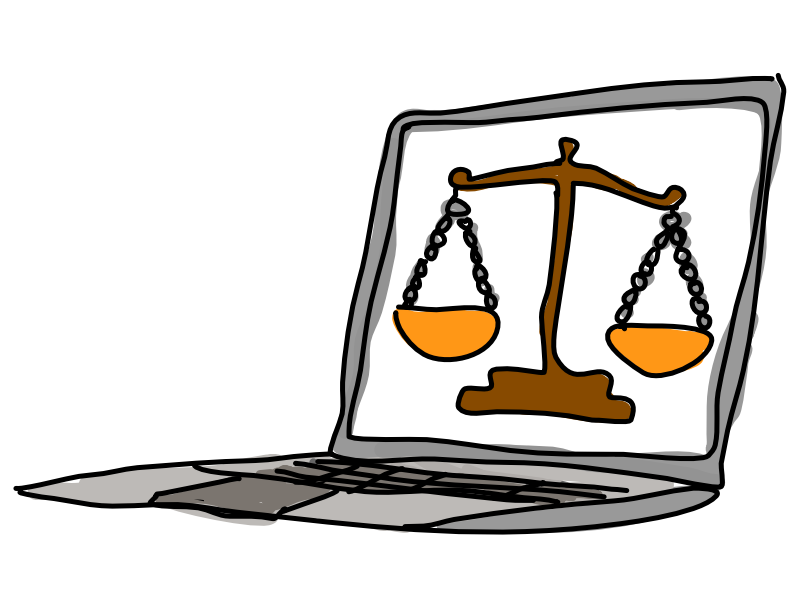
Invitation MIT/Stanford Legal Design Lab: Design Guidelines for Hybrid Courts
Please join us on 5/20 at 1pm ET for the public presentation of the MIT/Stanford Legal Design Lab design studio: Blueprints for Justice. As courts are grappling with designing hybrid court houses that include remote proceedings and virtual services, 8 MIT students have created proposals and guidelines on the future of justice and its physical…
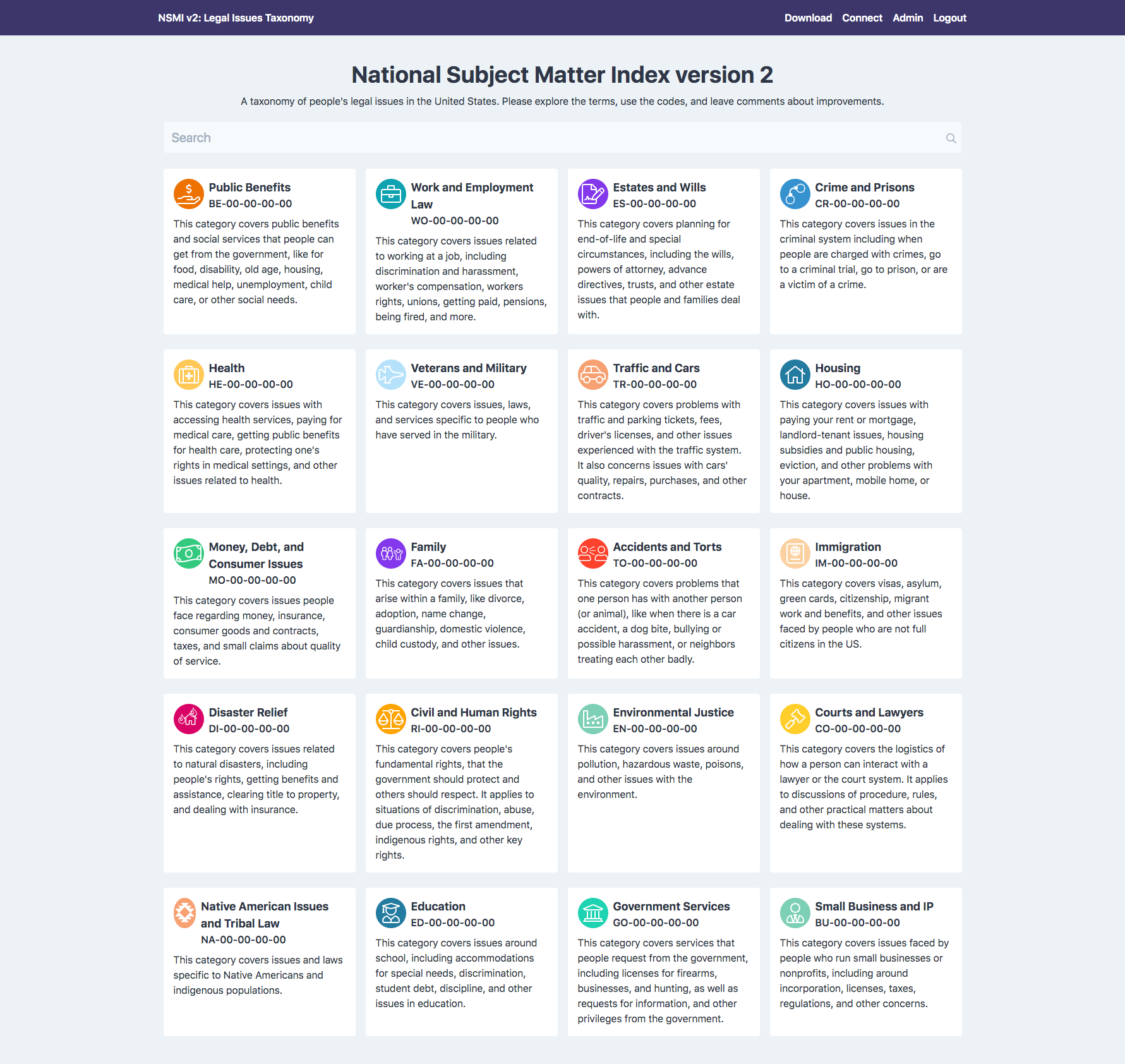
How can I use the LIST taxonomy on my legal tech project?
1. We need standard codes for legal problems. There’s lots of different words we can use to describe the same legal problem. Is this thing an unlawful detainer, an eviction action, a landlord-tenant dispute, or getting kicked out of your house? These words come from legal jargon, different jurisdictions’ terminology, and people’s everyday language around…

Blueprints of Justice
New Blueprints of Justice The Stanford Legal Design Lab is collaborating with Virgil Abloh, MIT Architecture and Oana Stănescu to redesign court houses of the future. Stanford students have the opportunity to join the lectures, roundtable discussions and limited spots are available to motivated students who want to fully participate in the design process. We…
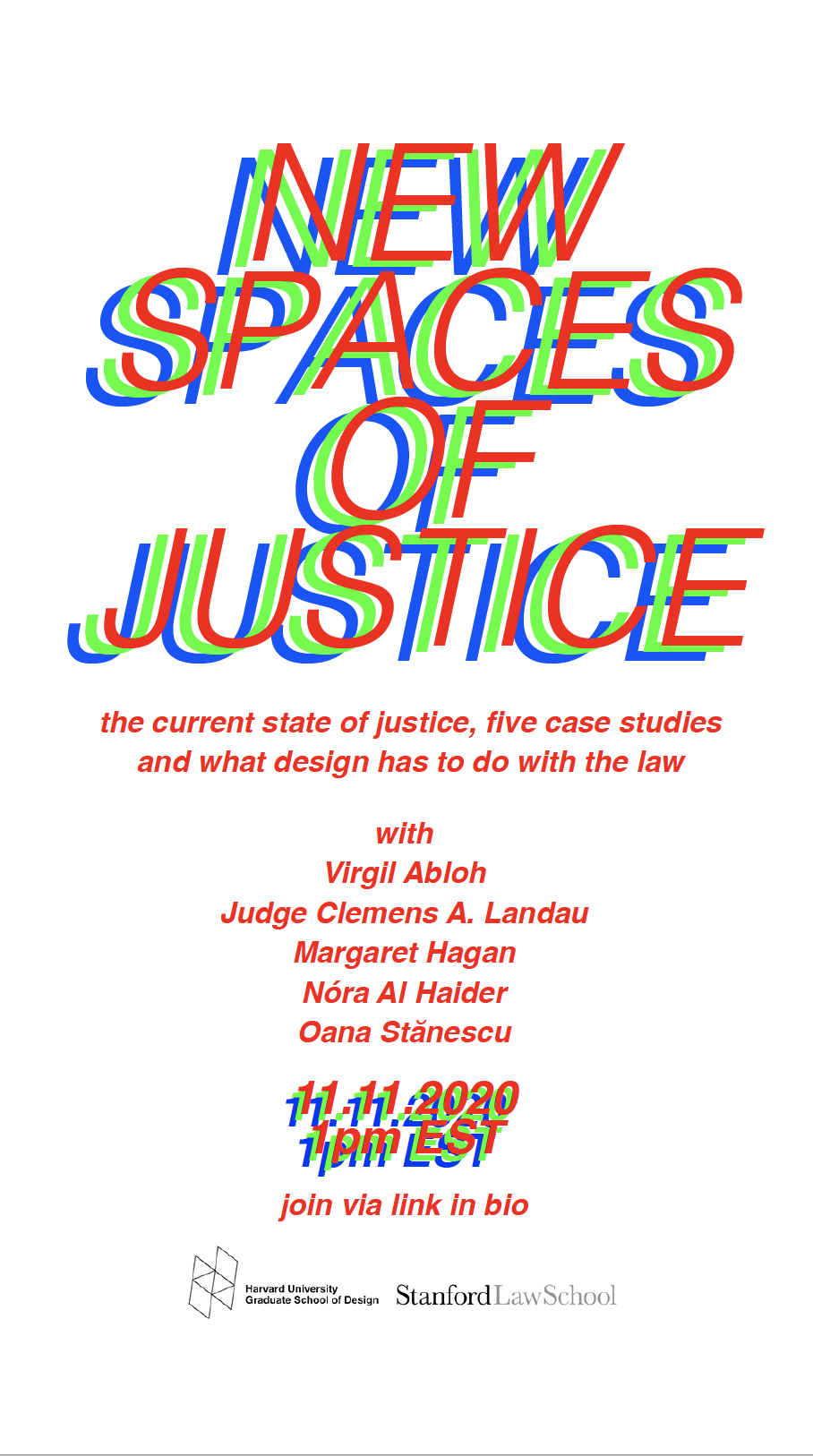
New Spaces of Justice: webinar
The Stanford Legal Design Lab is organizing a public webinar on Wednesday (11/11) at 1pm ET (10am PST) in collaboration with Harvard GSD and Virgil Abloh. These last couple of months, we have been working on designing prototypes for online courts and virtual legal services. During the webinar, we will showcase the prototypes and delve…
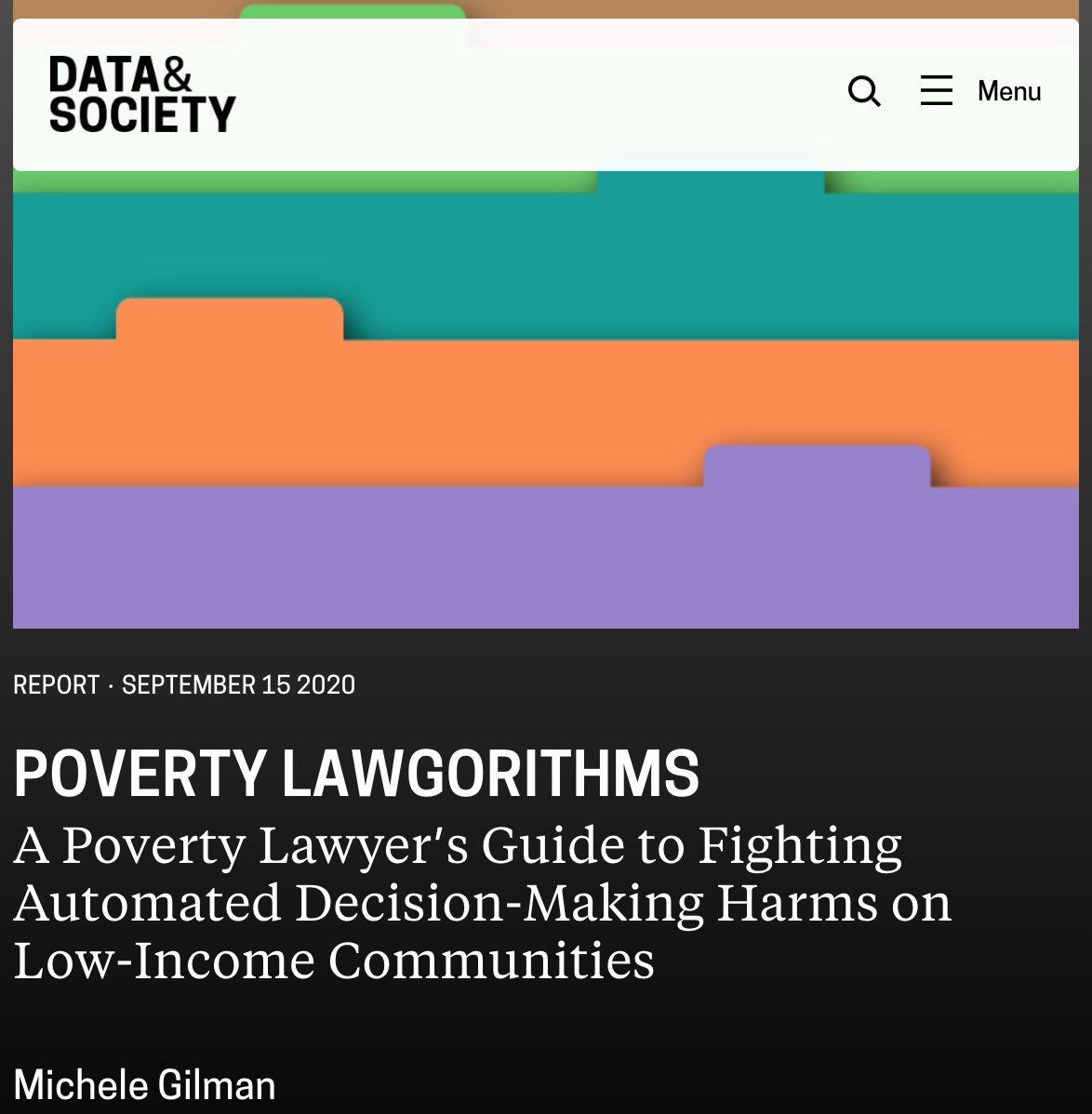
Lawgorithms: Poverty Lawyer’s Guide to Algorithms, AI, and smart tech
Here’s a highly recommended report, Poverty Lawgorithms, from Michele Gilman through Data & Society, on how lawyers working on poverty law areas can better advocate for more ethical, human-centered government systems. In particular, as courts, government agencies, and tribunals buy more ‘smart’ technology that automatically sorts people, predicts risks, and makes decisions — how can…
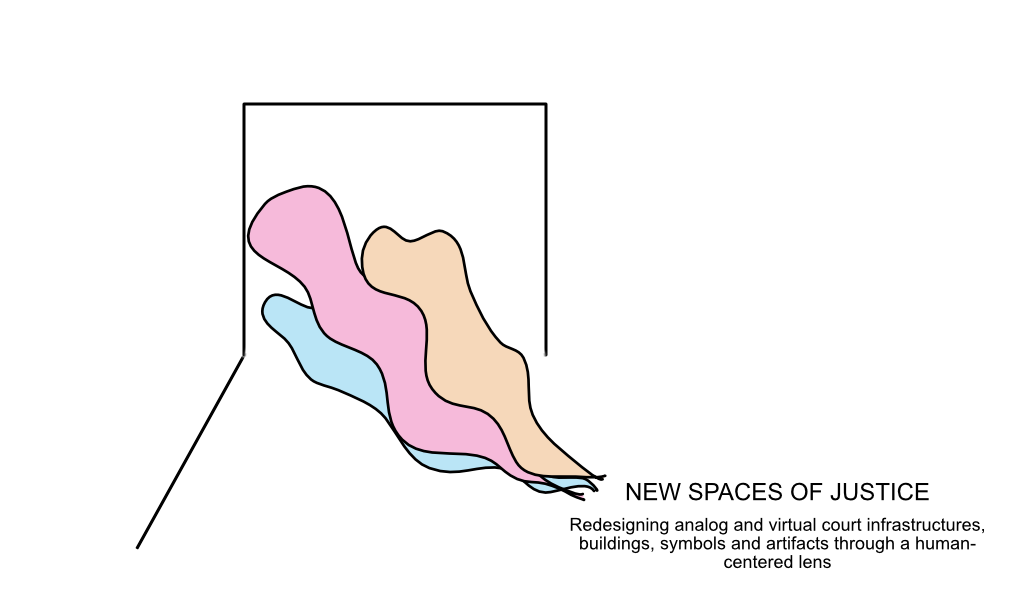
New Spaces of Justice: Workshop Series
Stanford students are invited to register for this unique workshop series organized by Nóra Al Haider (Stanford Legal Design Lab) and Oana Stănescu (Harvard Graduate School of Design) in collaboration with Virgil Abloh. The workbook materials are created by Margaret Hagan. The COVID-19 pandemic has made navigating the judicial system even more challenging since restrictions…
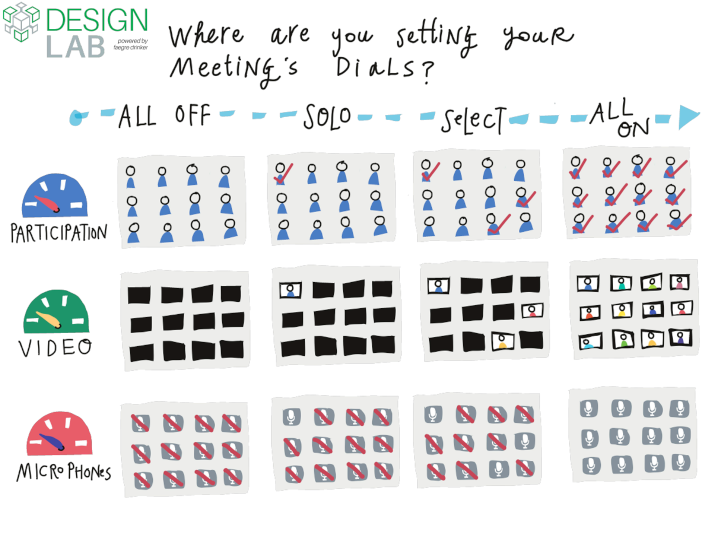
Pop Up Webinar Replay: How to Run a Better Virtual Meeting
After the past months of online work, legal professionals know all the ways that virtual meetings can go wrong: wasted time, audio disasters, low energy, technical confusion, lack of connection — the list goes on. In this one-hour training session, we’ll train you on how to facilitate virtual meetings that are more engaging and effective….
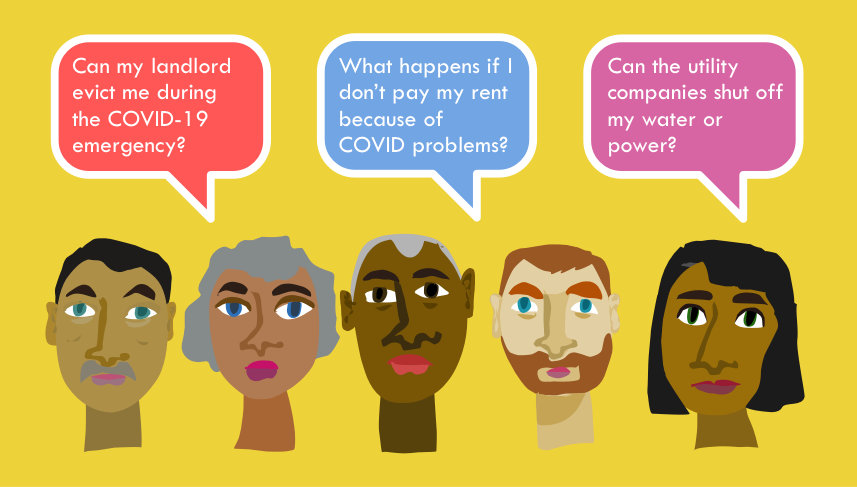
Renters’ rights in every state
Our Legal Help FAQ site has information for residential renters in all 50 US states, about what protections they have during COVID-19 and afterward. This covers rights around being evicted, going to court, paying rent, and getting assistance. It answers key questions that renters have in every state, like: Can I be evicted?What happens if…

Designing better online legal help during an emergency: Legal Help FAQs
Coordinating a national legal help platform for renters during COVID-19 This piece was originally published on our Medium publication Legal Design and Innovation. Since the COVID-19 pandemic hit the US earlier this year, there has been a legal crisis brewing alongside the public health one. The virus and the economic collapse have prompted an escalation of civil justice…
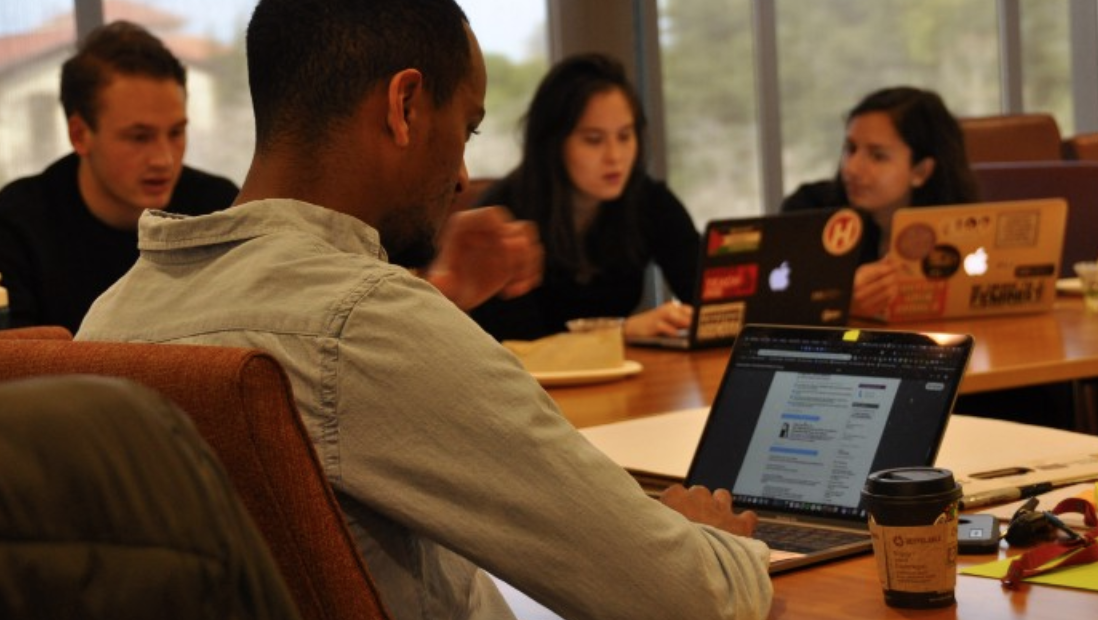
How to Design a Policy Hackathon
As an undergraduate at Stanford I’ve worked with the Stanford Institute for Economic Policy Research (SIEPR) and Stanford in Government (SIG) to organize two separate policy hackathons on the topics of Affordable Housing and Criminal Justice Reform. At each of these events, dozens of students competed in teams to create policy proposals and accompanying analytical tools to be evaluated and…
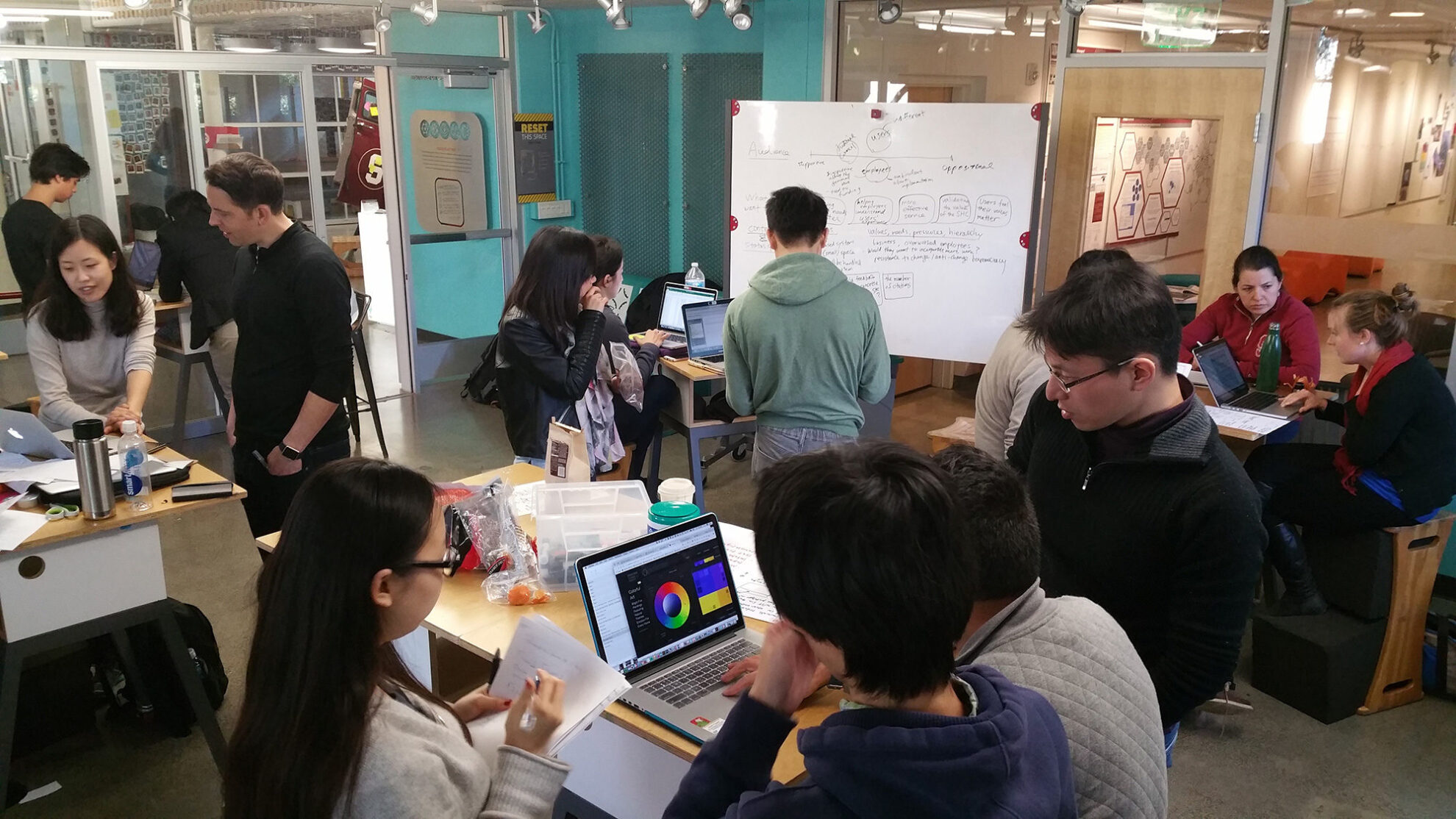

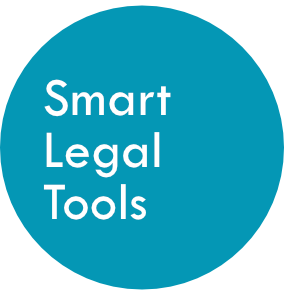
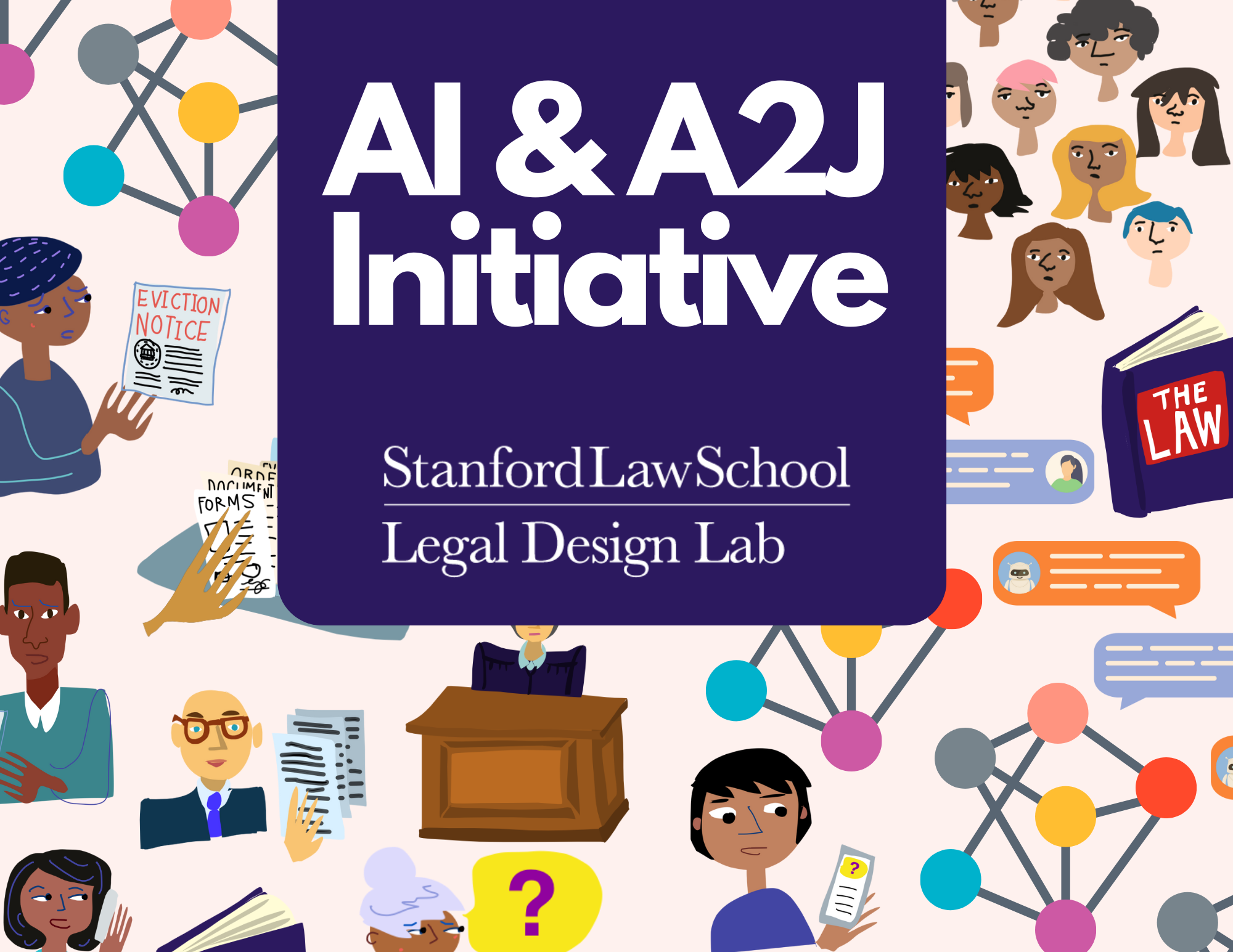
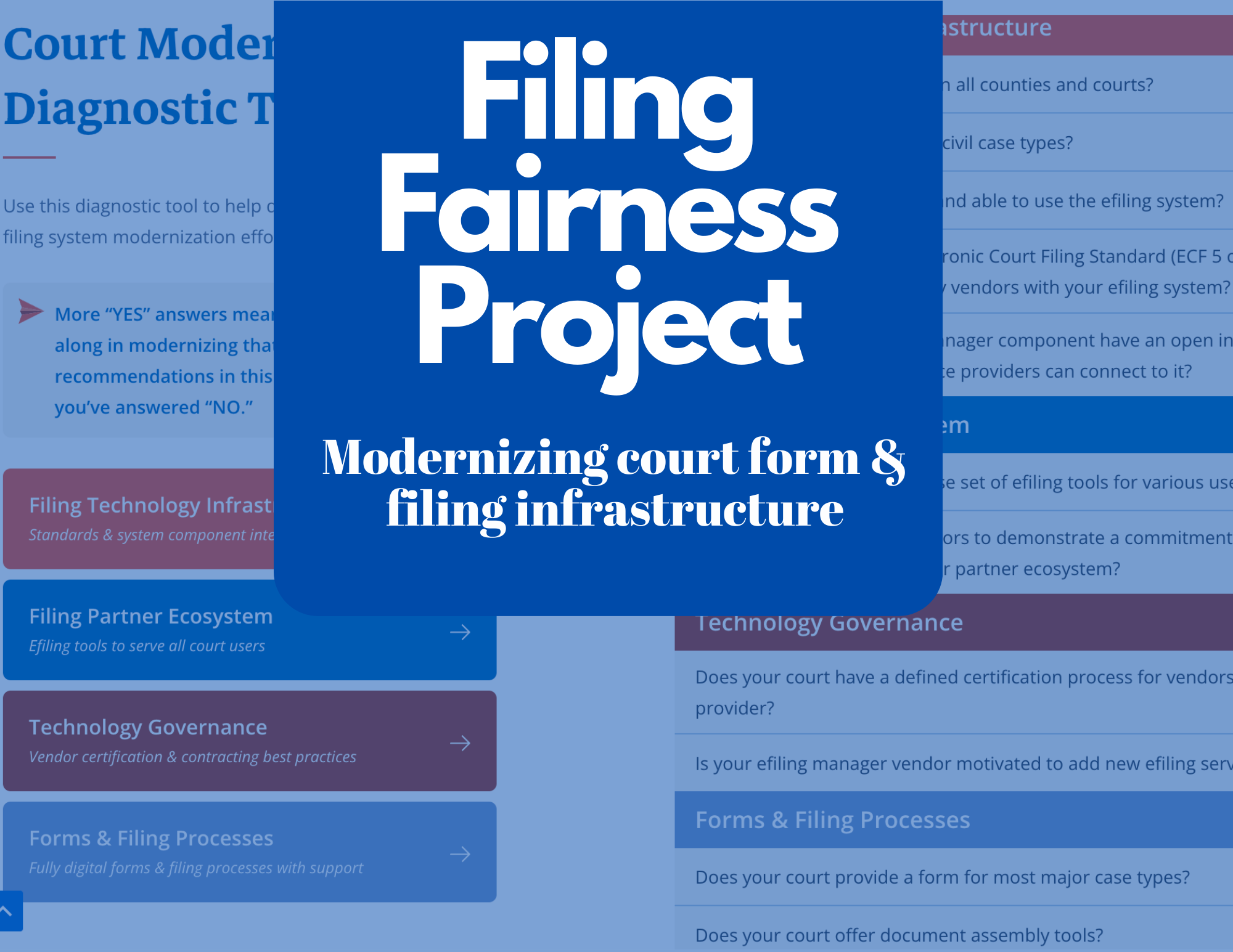
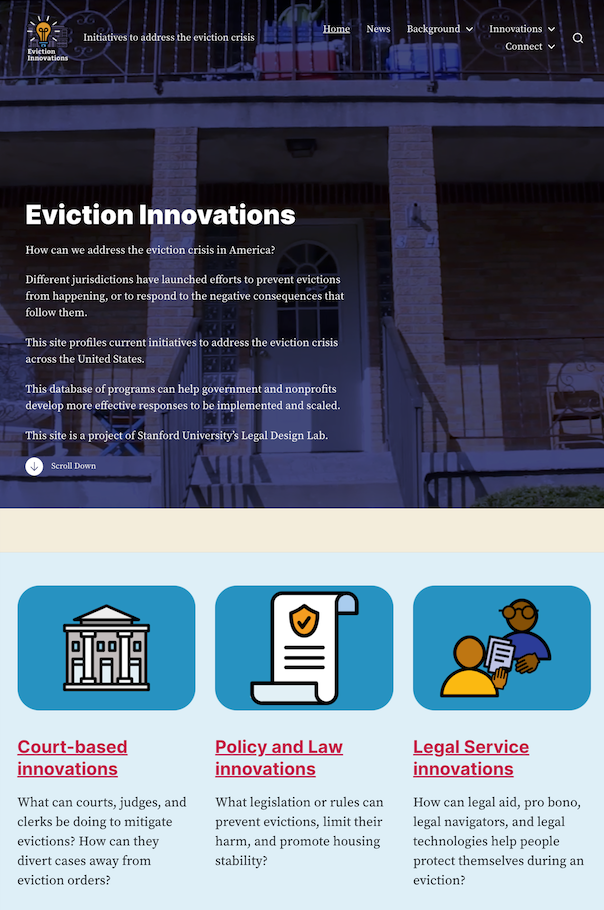


9 Comments
Hello team! Love what you are doing in the design space to make the law more accessible. Can you tell me about future events or course you have coming up? I would love to get involved 🙂
Do you have materials (or can you recommend any) on use of design principles in legal memos and briefs to be submitted to courts?
I’d appreciate any recommendations.
Thanks much!
LOVE THIS! Would like to stay up-to-date on your work.
I am now doing my research for my Governance Innovation Report for the graduate studies at the Ateneo de Manila University- Philippines, I chose to include design thinking/ human-centered approach as one of my frameworks. I am interested in joining your workshop/seminar (public or private) since it will be a great help in my profession as a legal aid advocate. I am looking forward to help more indigent clients, promote a more accessible justice system to all, and improve the legal aid services in our province. Please be an instrument of change through design thinking. Thank you.
My name is Valentina Osorio a law student from URosario in Colombia. I just finished my bachelor degree and waiting for the graduation. I learn about design thinking on a formation program in Accenture and I though that Design Thinking and legal was just like a utopia but now I know that is something real.
Thank you for all the books and content about Legal Design Thinking because I’m trying to figuring out what i want to do in my professional future.
Hi,my name is Lelisa. I am from Ethiopia. I had took my first degree in law at one of the governmental University(Haramaya University).please provide me opportunity to learn your school!
Hi there. I am interested in the Training you offer in human-centered legal design. I am the Marketing and Business Director of Dentons for Central America and found your LAB very interesting and with a lot of solutions we can apply to empower people globally. Can I get some information regarding the course?
Thank you so much.
I am interested in legal design thinking course. Please Can you send me infl about that topic?
Hello am cate from uganda. I didn’t do law at my first degree. I did education. Am I legible for this course? Thnaks